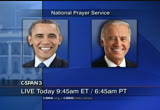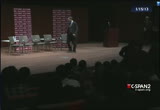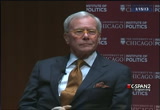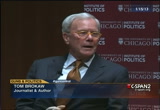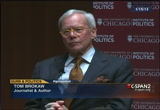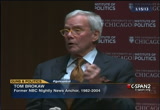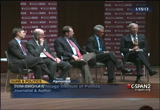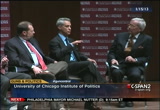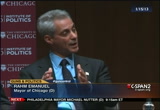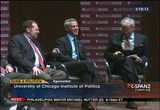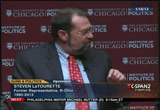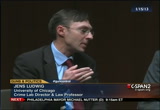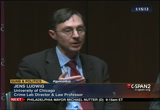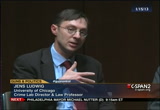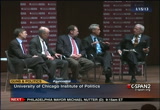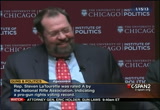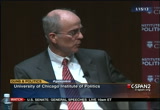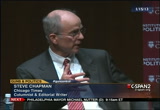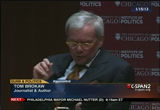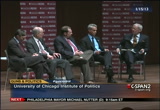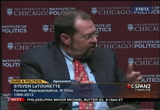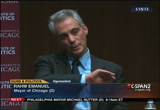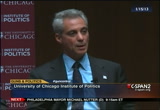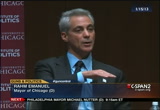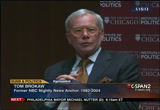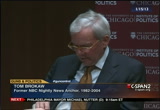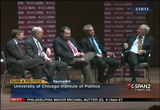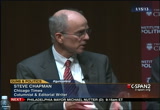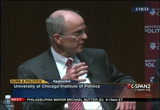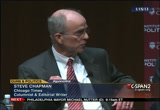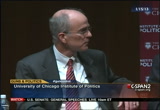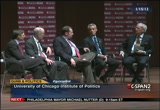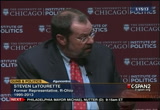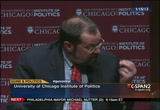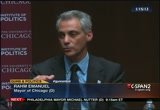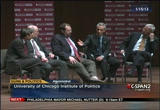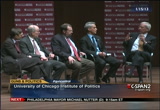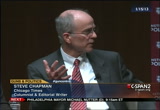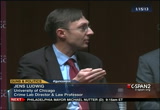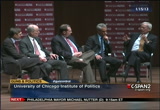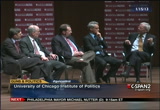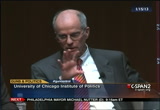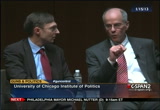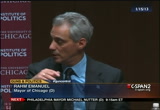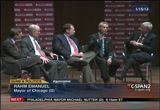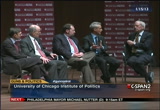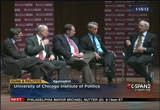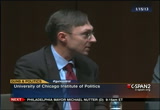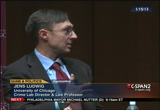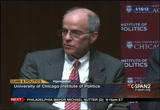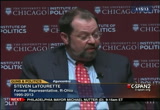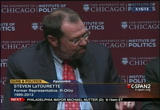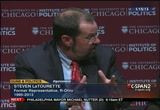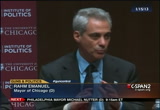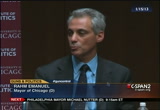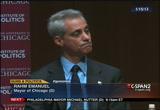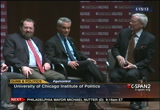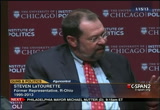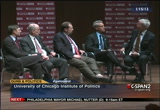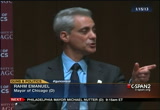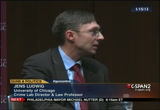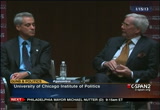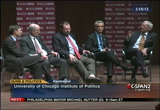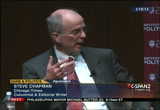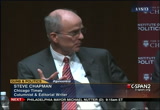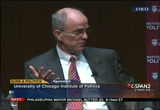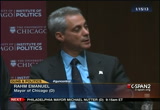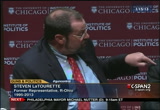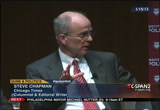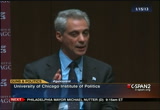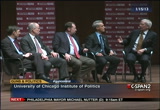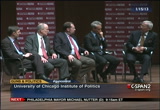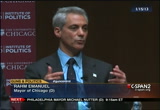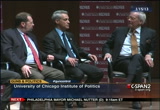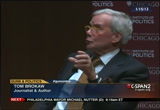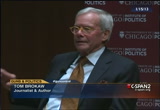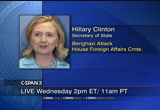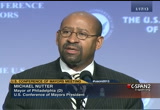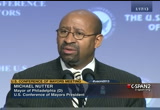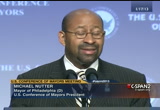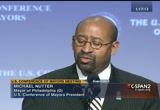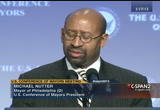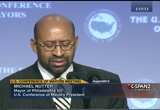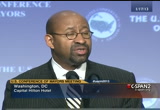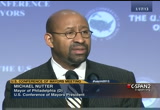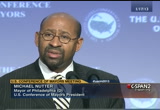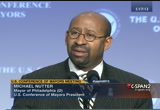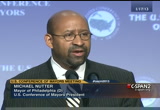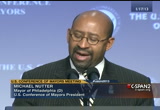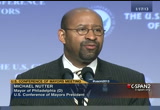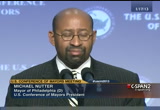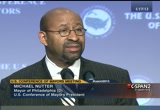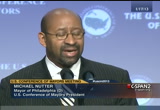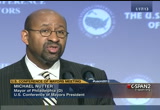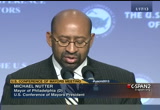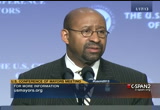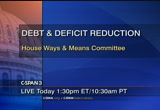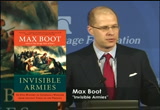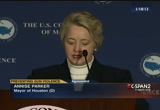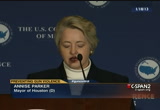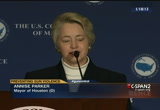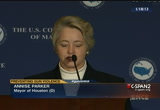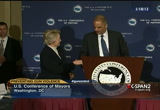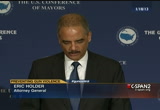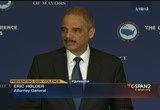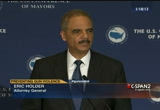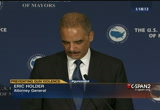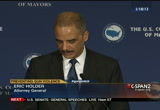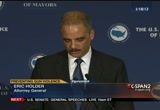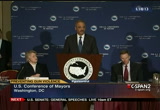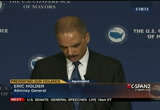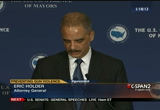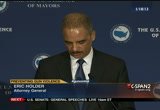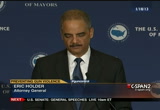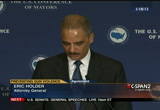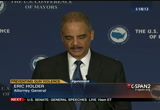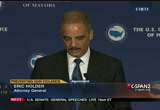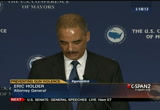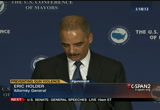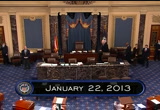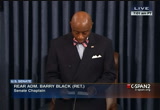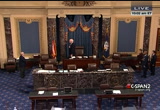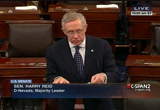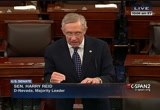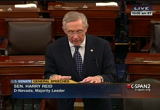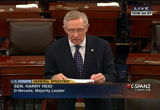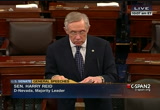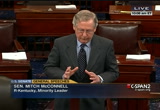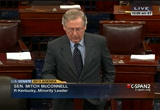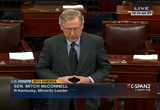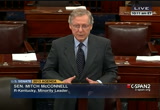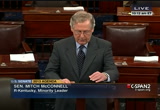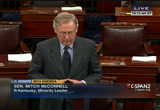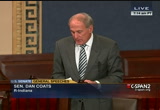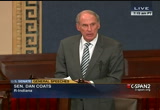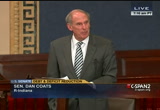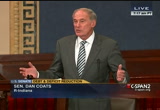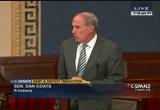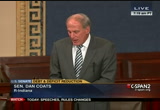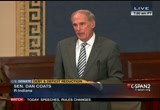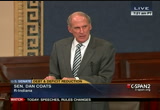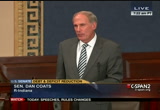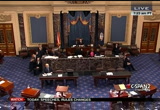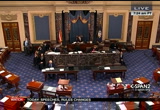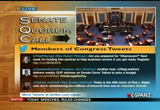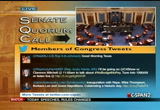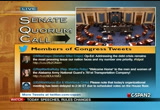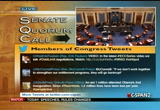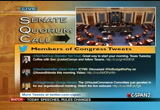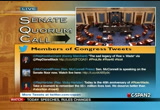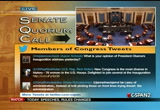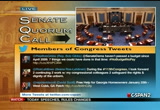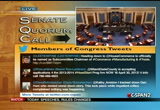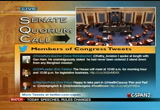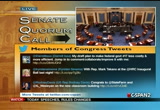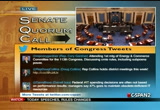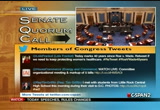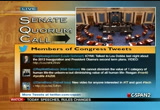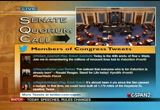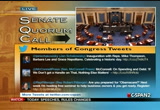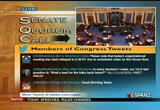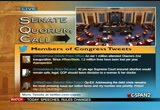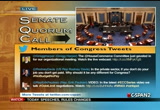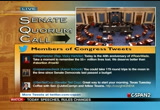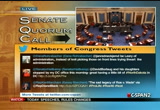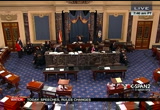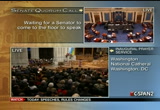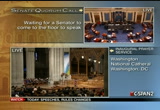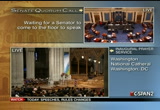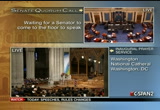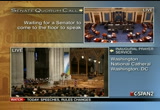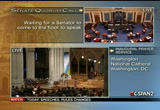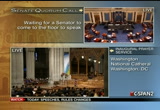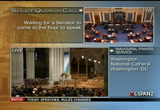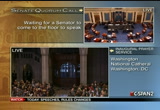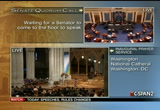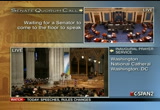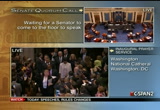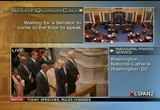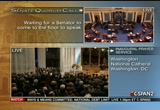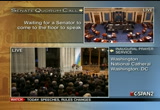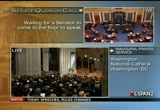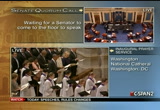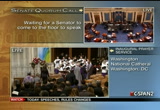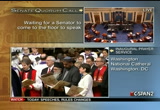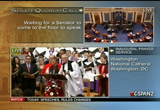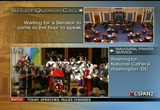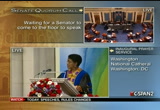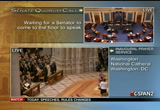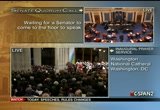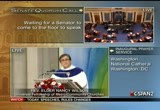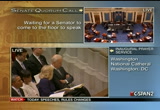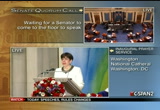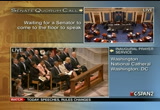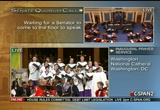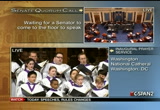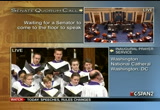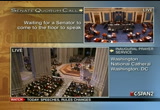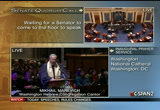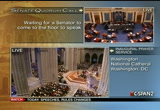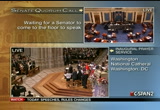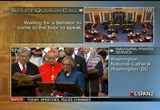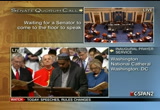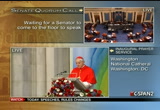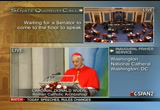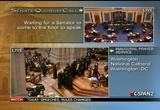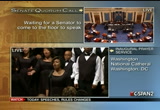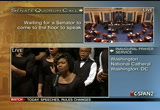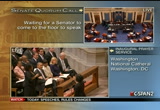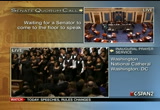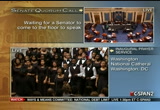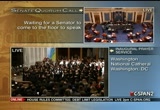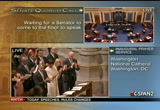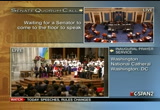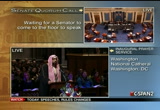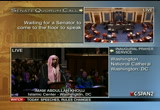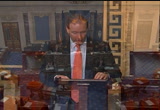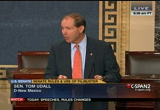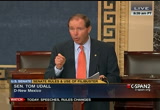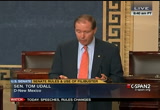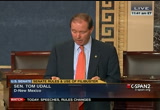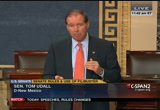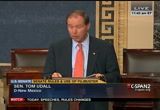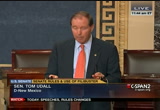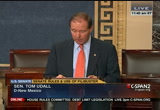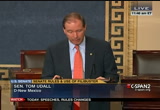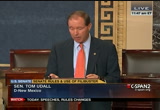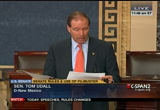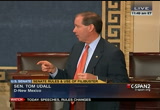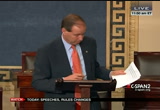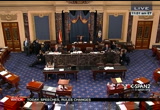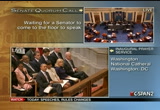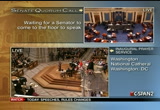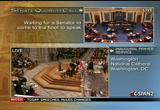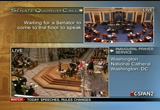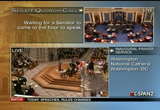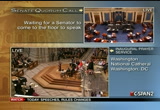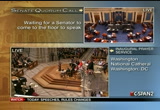tv U.S. Senate CSPAN January 22, 2013 8:00am-12:00pm EST
8:00 am
programming beginning saturday morning at 8 eastern through monday morning at 3 -- 8 eastern. nonfiction books all weekend, every weekend right here on c-span2. >> you're watching c-span2 with politics and public affairs. weekdays featuring live coverage of the u.s. senate. on weeknights watch key public policy events. and every weekend the latest nonfiction authors and books on booktv. you can see past programs and get our schedules at our web site, and you can join in the conversation on social media sites. >> several live events to tell you about today on our companion network, c-span3. president obama, first lady michelle obama, vice president biden and his wife, jill biden, will attend the national prayer service at washington national cathedral at 9:45 a.m. eastern. at 1:30 p.m. eastern the house ways and means committee holds a hearing on debt and deficit
8:01 am
reduction. examining the history of the debt limit, how past congresses have dealt with the him and whether the constitution provides options to the executive branch when the debt limit is reached. the house is expected to vote wednesday on increasing the nation's current debt limit of nearly $16.5 trillion. >> c-span, created by america's cable companies in 1979, brought to you as a public service by your television provider. [applause] >> next, a discussion about gun violence and gun control measures. chicago mayor rahm emanuel was joined by ohio representative stephen latourette at an event hosted by the university of chicago's institute of politics. former nbc nightly news anchor tom brokaw moderated the discussion. it's about an hour and 15 minutes.
8:02 am
>> thank you all very much for being here. i've been in this business for a long time, a half a century, and there are occasions in american life when one issue kind of galvanizes the country. and it seems to me that as we begin this year that guns, violence and can their place in american lives have suddenly electrified the country. it's a discussion not just at the university of chicago and as elite an constitution of this is, but the town in which i grew up in the great plains of south dakota and montana. in the big cities of not just chicago, but los angeles and houston season and dallas and other places. we are in a kind of dark way a unique society in terms of the place of violence in american life. and especially the place of guns.
8:03 am
now, i want you to know something about me. i've grown up with guns. i got my first gun when i was 10 years old. it was an extraordinarily important ritual for me for my father to give me my first .22 lever action, it had been in the family a long, long time. and hunting was a very important passage for me, and it continues to this day. i still have a collection of guns at my ranch in montana where rahm has been, i'm not a big game hunter, but i have guns that can be p engaged in that -- can be engaged in that. i'm primarily what they call a shotgunner, i'm a bird hunter. and as a shotgunner, you eat what you kill when you can eat them. and when you can find them and shoot them. so i have been in the midst of this culture for a long, long time, and i find myself and my journalistic role as a kind of intersection in america. because i foe -- i know the
8:04 am
kinds of weapons that we're talking about, and i also know the consequences of pulling that trigger ask what happens when you -- and what happens when you do. moreover, when i left the great plains as a journalist, i immediately went to the urban areas. i went to omaha and atlanta and los angeles and spent a lot of time in the washington d.c. and in the course of my career, i have been utterly vexed by our inability as a civil society, a nation that takes such great pride in the rule of law, to in some way come to grips with the mace of of guns and violence -- with the place of guns and violence. and before we begin this discussion, i'll just tell you one very personal anecdote. three days before the sandy hook shooting, i was in denver, colorado, on personal business. and i was driving through the denver suburbs, and i passed into aurora rah, colorado, and
8:05 am
saw the sign and thought to myself -- as journalists often do -- oh, my god, this just disappeared from our landscape. it happened not that long ago in which a young man, now appears to be utterly deranged, b went into a movie theater and began shooting down people with an assault weapon. and it went away. the not part of the presidential debate, it was not part of the fabric of our lives, it was not part of the daily journalistic diet. so on that wednesday night i e-mailed the producer of the "meet the press" show that was coming up on that sunday in which they would be talking about big ideas that america needs to be thinking about. and i said you should put shooting at the top of the list. we have been through aurora, the sikh temple, the oregon shopping mall, think about this, this is before we got to sandy hook. in newtown.
8:06 am
we'd had a time of absolute carnage in america to say nothing of what was going on in the city of chicago and in most urban areas around america. 506 homicides in chicago alone. so we have a lot of issues before this country as we dive now into the 21st century. but it seems to me that we have no more important issue at the top of the agenda than to decide who we are and what kinds of cultures we want to pass on to our children in the use of weapons, in the place of violence and their ability to deal with this in some kind of a rational fashion. can't think of a better group of people to talk about all that tonight, so i'm very grateful to have all of you here today, and it was important to me to be able to make the trip from new york out to chicago, and i have to go back tomorrow because i feel so strongly about it. let me begin with our two
8:07 am
political figures. rahm, are we at a tipple point? do you think that new -- tipping point? do you think that newtown changed thing? >> yes, and a small no, and here's my, here's why. yes, you're at a tipping point. there's no doubt that we have a better discussion and greater or concentration. of when i was the point person for president clinton in passing the brady bill which was in the late part of november of '93 and then the assault weapon ban in the house in the spring of '94, it was those two bills that were very focused on criminal access. president clinton's gun legislation post-columbine did not pass. so the notion that everybody should rely on quote-unquote the energy and force of newtown i would caution not to do that. it's clearly galvanized the country to have an honest conversation and look internally and have a serious conversation,
8:08 am
but brady bill and the assault weapon ban were done without, quote-unquote, a columbine or what happened in virginia, any of those incidents. i do believe just in the last four years or i would say the last eight years of politics this, what happened there has made all of us have a discussion that has been sitting on the sidelines or the periphery of politics to be focused and this, obviously, tomorrow morning the president's going to introduce his legislation or his package and decide what legislatively he's going to do, what he's going to do by executive order. but we are at a tipping point to have a discussion that's been postponed, delayed or for whatever reason hasn't happened. but my small kind of flashing yellow light of caution is when you think of the last time we had success which goes back to '93 and '94, those were pre-columbine when the president had columbine, his entire package fell flat. >> congressman, you had an a rating from the nra. >> right. >> and you actually voted for reducing the waiting time for buying a weapon from three days
8:09 am
to one day. >> right. >> do you think that we're at a ing point, that there will be some kind of a seismic change? >> yeah, i do. since the topic is politics and guns, i would as a parenthetical that a lot of people widely credit the 1993 crime bill for the reason that the republicans took the majority for the first time in 40 years. so it really has a lot to do with the politics. and i'm very grateful to be at the university of chicago, another note. i think only in chicago could you have something called the nonpartisan bipartisan center for politics with david axlerod and rahm emanuel. [laughter] >> that's a whole different story. >> we had to come back as bipartisan in this city. >> oh, you do? [laughter] if you go so far to the right, you basically come back to the left. >> but i think the conversation's changed since newtown, and i will tell you that -- and this goes to i don't care whether it's the gun
8:10 am
discussion, the fiscal discussion or anything else. at this moment in time you have republicans, and i happen to be one of them, that have the a rating with the nra that would be more than happy to sit down and begin to have the conversation about guns. but it has to be the right conversation, and it can't be one of these situations where there are some people in the country who don't want anybody to have any kind of gun. so there can't be an overreach. and what we get in these political settings sometimes is one party or the other sort of feels their oats, and says, man, i've got that guy right where i want him, and i'll get everything i want. if you think about the shootings that you referenced, all but one were committed by with a disturbed white male in this their late teens or 20s. and we're not talking about banning disturbed white men. and so it has to be the right conversation that actually makes a difference and makes sure that
8:11 am
it reduces violence not just makes a political statement. >> let me ask the academy representatives who are here. as you see it from -- and i'm not using this in a derisive way -- from the ivory tower, as you look at the place of our society in the 21st century and as the champions as we see ourselves of the rule of law and civility as a kind of, as ronald reagan liked to say, a city shining on the hill, what befuddles you most of all as you look at this debate about the place of guns and violence and the second amendment in america? >> i think one of the, um, one of the most interesting things for me to see with the discussion the idea that comes up over and over again about the futility of efforts to regulate guns. i think i one statistic that almost everybody e knows about guns in america is that we have about 300 million people and
8:12 am
about 300 million guns. and that leads lots of people to just throw up their hands and think anything we do on the regulatory side is futile. i'm actually not that pessimistic myself, and i hope this is one of the themes that comes up in the public discussions as we move forward after the president announces tomorrow for two reasons. one thing that's really important to keep in mind with guns in america is that they are a very concentrated and very sedentary. so about 10% of all the people in the united states own about 80% of the guns. they're mostly middle class, middle-aged people living in rural areas, and they hold on to their guns for a long time. on the other hand, most of the people engaged in crime are teens and young adults. one of the -- and most criminal careers are short. and so one of the things that that means is that there's always a new generation of young people who are troying to solve the problem -- who are trying to solve the problem fresh of getting their hands on guns.
8:13 am
and i think one way that you could think about the challenger here or the situation here is you could think about the united states being just like a giant bathtub filled with 300 million guns. we don't need to worry about the entire tub, we just feed to worry about -- we just need to worry about the drain, trying to divert the guns away from the high-risk hands. the one other thing that i want to mention for the conversation right now is we have a bunch of stuff going on at the federal level, and we have a bunch of states trying to innovate on their own. and i think one of the things that's important to keep in mind here as well is, um, aside from hawaii, no state is an island. and what every state is doing on the gun regulation side is relevant for what happens in other states as well. and city of chicago, the state of illinois, we have among the more restrictive gun laws in the country. my family lives in new jersey, i drive out there every
8:14 am
thanksgiving to see them, nobody b stops me at a single state or city border as i go. this porousness of city and state borders means there are reasons to think that the national regulation on this side is going to be even more or meaningful than what happens at the state and local level, and so this really does seem like a very big moment in this discussion right now. >> ron. >> the only thing i wanted to underscore, while you drive to new jersey, you're going to go through indiana. okay. 58% of the guns we pick up in crimes in the city of chicago come outside the state of illinois. and to underscore that point, which i think does get to what steve said a little earlier, and that is, obviously -- you can have a discussion, and you can have a set of of policies, but we're going to be as good as our national congress setting a floor with legislation. and if california wands to exceed it for whatever or reason, they'll go farther. but the national discussion, and i think the it's one of the
8:15 am
priorities in the discussion tomorrow and i think you can get bipartisanship on it. when the background checks were set up because of of what happens at gun shows and everything else, 40% of the guns that are traded or bought are not covered with any background five-day waiting period. that's not a loophole, that's an exemption. and that has to be dealt with so you create a national floor that's comprehensive so what happens in indiana doesn't flood the city of chicago, cook county. and it's essential to underscore that point. >> if i could, it needs to be a national be fix, and it has to be federal preemption because the patchwork of states or cities working by themselves is not effective. i went to the university of michigan because the drinking age was 8, and it was 21 in ohio -- 18, and it was 21 in ohio. that explains a lot now. [laughter] and i was still a republican. [laughter] so you can't have, you can't have a hot spot.
8:16 am
>> what do you think the chances are that some of the state laws will withstand the federal test and the judiciary, that, for example, new york has just passed some very stringent laws in which, for example, mental health workers are required to report to the authorities if they are suspicious of someone who may be a danger to society, and they've cracked down the place of assault weapons and automatic weapons in the state of new york. it is, after all, a second amendment of the federal constitution. is that going to withstand the kind of test that a lot of people make legal challenges to? >> steve, do you want to take this? >> steve? >> i think it's pretty hard to know at this point what will stand up to the supreme court review and what won't. we just had a ruling from the seventh circuit court of appeals in chicago that the illinois wan on conceal -- ban on concealed/carry is unconstitutional under the supreme court's recent second amendment decisions.
8:17 am
a federal court, federal appeals court in new york took exactly the opposite view. if you go back and read the supreme court decisions in heller and mcdonald, the two really important ones, um, it's -- they suggest that a fair amount of, um, latitude for the democratic branches of government to regulate guns, but they also put a definite boundary on how far those can go. so an outright ban on handguns like we had in chicago before, like washington, d.c. had, that goes too far. whether the second amendment right goes as far as to extend the right of self-defense that the supreme court found that you have in the home to when you leave the home is another question spirally. entirely. and i think, ultimately, probably the what happens in
8:18 am
congress is not going to be greatly affected, is not going to be greatly constrained by what the supreme court is going to allow. i think the court on things like regulation of particular types of guns, waiting periods, background checks and things like that is, will probably be willing to -- we'll probably be willing to allow that sort of thing. >> i wallet you all to know that -- i want you all to know that i've opinion sending mash notes to my wife who's away. [laughter] i know this is a big appointment for you every day, you may not see nightly news tonight, but chuck todd actually had a report on what the president's going to recommend tomorrow, and i thought i would share that with you and get your reaction. beginning with you, congressman. universal background check, the president's going to push hard for that. prohibition of high capacity magazines. prohibition of anything above ten rounds. there were 30 rounds in the magazines that were used in newtown. some type of assault weapons ban, some type.
8:19 am
anti-trafficking legislation to impose stiffer penalties on gun sellers. in addition, the gun control source says that obama will not announce 19 executive actions, but among the ones he will choose are prosecuting people who fail background checks, 71,000 did that last year. they lied on their background check. reinvigorating federal research of firearm deaths and crimes. also recommendations will include more work on mental health, school security although not arming guards and increasing funding. and entertainment video games, although the source does not know exactly what that means. that's a whole other situation we'll get into here in a minute. what do you think the chances of what we've seen here as an outline getting through the body that you just left, congressman? >> well, slim and none. and it's really why i was talking about overreach. let me talk about the democrats for just a second, because harry reid talked about the assault
8:20 am
weapon ban and the chances of his being able to get it through the united states senate. he said it ain't gonna happen. and so if you look at the red state senators who are up for re-election in north carolina or out west or down south or wherever they're from, i don't think he can lift it. and can that's what i'm talking about in terms of overreach. if this was something where you said close the loophole on gun shows, catch the 40% of people who are going into the shows and escaping, buying guns if they're mentally disturbed and we should catch that and reasonable restrictions. the problem in the heller case and what d.c. was doing is they said you couldn't have a gun unless you registered it, but then today wouldn't let you register it. i mean, that's an effective you can't do it. and that does, in fact, go too far. so if it's a common sense -- and, you know, quite frankly, i don't know why ten. i don't know why somebody needs ten bullets, let alone thirty. so ten doesn't seem like some
8:21 am
magic number to me. and, again, to the gun owners, that sounds like something somebody made up, ten. so i think that the president'stive orders -- executive orders can be accepted by the republican party, and if they did the incremental approach of background checks and closing down nutty people buying guns -- >> is that what you meant by clearing the table of the small items and then getting to the big items? >> yes. in '93 and -- in the brady bill of '93 and in the assault weapon, the brady bill was about a five-day waiting period. the assault weapons ban was about the guns of choice of gang bangers. it was all about criminals. and so when i, my view is whatever you can do by executive order, take care of it. executive order is not as good as legislation, but if you can do it, do it. and make this focused on both the criminal act as i think it
8:22 am
would stand both court, it will also martial public opinion. as you get away from that or start to move away from the center of gravity from that, you start to give fray into the politics that can get this thing jammed up literally. i do think one is -- well, there isn't nothing -- not to argue with steve, but i will -- there isn't anything magical about ten, but i will say this. mike thompson who's a congressman out of northern california, also a gun owner who's leading the democratic effort in the house, there's federal legislation today as it relates to shotguns that is banned no more than three at any one time. we are more protective of ducks than we are of kids. it's a federal legislation that covers alabama, mississippi, southern illinois, all parts. so if ten is not magical, i'm willing to go to three as a cliff. so we're there. [laughter] but that said -- because the assault clip changes the type of gun. it dramatically changes it. two, i do think of comprehensive
8:23 am
background checks that deal with criminal activity would be essential to anything closing on that loophole. obviously, the seller pieces you can do. i do think usually people think about executive order, something the president would seen, i think he has to direct the attorney general as a measure of each attorney what they're doing on gun prosecutions. we have a u.s. attorney position here in the city of chicago. it's opened up. our gun prosecutions as a city compared to, you compare it to others, kind of u.s. attorneys' positions, lags other ones. there should be a standard, and they should be measured and have to report. and can that is within the executive authority because you have gun laws that sit on the books and do not get prosecuted. so i would put the prosecution and holding the u.s. attorneys to a standard as part of the executive authority of what a president can do. >> i wanted to share with the audience just the kind of passion that exists on pote sides of this debate -- on both sides of this debate, and i'm
8:24 am
sure many of you are aware of it. let me just do something about this audience. i'd like to know how many of you have ever fired a gun? more than i would have expected. how many of you own a gun? fewer, obviously. how many of you feel strongly about your right to own that gun without conditions? a few. let me share with you what stan mcchrystal who was a special forces officer for the united states, most of you know who he was. he was the man who lost his job as a result of some intemp rate remarks, mostly made by his staff when he was running the war in afghanistan. second generation military man, i think rahm agrees with me kind of best of breed when it comes to a military figure. >> great national asset, without a doubt. and great human being. >> here's what he said on
8:25 am
television last week. i spent a career carrying typically either an m-16 or an m-4 caribbean. the m-4 car boone fires a -- [inaudible] caliber round which is .556 millimeter at about 3,000 feet per second. when it hits the huey p. long body -- human body, the effects were devastating. that's what our soldiers ought to carry. i personally don't think there's any kind of need for weaponry on the streets. we've got to take a serious look. i understand everyone's desire to have whatever they want, but we've got to protect our chirp, we've got to protect our police, we've got to protect our population. serious action is necessary. sometimes we talk about very limit limited action on the edges, i just don't think that's enough. that's what he said on the morning show. then in the modern media culture in which we live, there were a lot of responses including this
8:26 am
one, always anonymously. i beg to differ with general mcchrystal that an ar-15 semiautomatic rifle should be possessed only by the military. what if our own government becomes so tyrannical that we find ourselves in the second civil war to recover our lost or stolen constitutional rights? do we really stand a chance with revolvers and perhaps compound bows? general mcchrystal seems to have forgotten that our country was formed against a city ran call government. heaven forbid, we must have resources to win. and then another response, it is the constitution, mr. mcchrystal. i trust the men that wrote it a great deal more than you. what if the battlefield becomes your own backyard? >> if i could jump in here at this point. >> yeah. >> i think the the stuff you just read, i think, captures some of the incoherence of this whole debate because i think what both opponents of assault
8:27 am
weapons and makers of assault weapons -- and i use that term in quotes because it's not a technical term -- um, is to greatly exaggerate how different they are from other guns. and tear actually not -- they're actually not. what distinguishes an assault weapon as it was defined in the 1994 law is not how fast it can fire, it's not how lethal the ammunition is, it's not how accurate it is, it's mostly cosmetic things like whether it has a bay bayonet now, whether it has a pistol group. >> [inaudible] >> they look like military weapons. if you're talking about how they actually function, they're no different from all sorts of ordinary hunting rifles. they're semiautomatic, tear often referred to -- they're often referred to as automatic weapons, they're not. that's a huge difference between what the military has and what civilians can buy. it may look like what the army
8:28 am
has, but it doesn't do what those guns do. and that's what makes this for somebody like me this whole debate or very frustrating, because you spend a lot of time trying to disabuse people of misconceptions that opponents of assault weapon as well as some people on the other side seem very attached to. >> will but, steve, i've got a lot of sporting weapons. none of us have 30-round magazines that we can shove into a sporting rifle, for example. and i've fired on a semiautomatic basis the kinds of assault weapons that we're talking about here. and by the way, they can be constructed in a hundred different ways now because there are all these kits tack allow you to put together things that stay within the limits of the law -- >> but i know people of who have ar-15s with 30-round magazines, and what they use them for is target shooting. >> right. >> the number of people who get killed with assault weapons compared to the number of murders we have of in this country is very small.
8:29 am
you're far more likely to be killed by somebody with a knife than somebody b with an assault weapon. 80% of the gun homicides in this country are committed with handguns, which are not affected by the assault -- >> but would you concede that the worst of the carnage that we've had in the last year have come with assault weapons? >> i mean, that's, obviously, as a factual matter, it's true. the question is, if you take those guns away, are you depriving people who want to do that amount of damage of of weaponry that would be equally effective for their awful purposes? and the answer is, you're not. there are plenty of guns that were available under the assault weapons ban that would be available under the proposed one that would be equally or more destructive than the weapons that they used in those mass shootings. >> before we -- there are a couple of people who want to comment on this, but let me just
8:30 am
ask you, how old are you? >> how old am i? >> yeah. >> i'm 58. >> all right. you and i -- i'm older. [laughter] more than i like to acknowledge, by the way. >> it's an unfair question. >> in the course of our lifetime and as good luck owners -- gun owners and the people who are aware of what's going on with weaponry in america, would you also acknowledge that there has been the introduction of those kinds of weapons in a way that we didn't have them before and didn't feel the need to have them before? >> i mean -- >> the 58 question was a lot easier, don't you hi? [laughter] >> the 58 question was a lot easier. >> i peen, there are lots of -- i mean, there are lots of things that we didn't have when you and i were young, lo these many decades ago. >> no, when we were young, but if we liked guns and wanted to use them and they were a part of our life and they were part of the culture in which we grew up
8:31 am
about hunting and target shooting and all those other things, they satisfied our need for them. but however or you describe an assault weapon and the platform for an assault weapon which can be modified in a lot of different ways these days has taken over, as you know, a lot of gun enthusiast, has it not? >> i mean, they're selling a lot of them right now. >> right. and more every day. i'm sorry. all right. >> 99.5% of those guns are never going to be used for anything but hunting, target shooting, home protection kept in a place for, you know, in case of a home invasion. very, very, very few of them are ever going to be used for criminal purposes. >> rahm? >> did you want to say something, steve? >> i just want to say something about this whole business of what people are using today, that's how romney lost the election about the horse and bayonet thing. i wish we'd stay away from that. as the president said, we're not
8:32 am
using bayonets anymore, and so it is a different type of weaponry. the other thing that's missing here, i think, and when i talk about overreach that nutty e-mail that you read and general mcchrystal's observation is people always say, well, why do you need an assault weapon? nobody needs an assault weapon, but that's really not the issue if you read the heller case and you go back to marbury v. madison. why does somebody in this country need to have a trial by jury? why does somebody who's robbed a bank need to have the fourth amendment protection of having a search warrant issued before you search him? nobody needs those things. the issue is that they're enshrined in the constitution. and so what you have to do is make sure that you work with what the supreme court has said, and the supreme court has said that the right to bear arms -- it's an individual right, first of all, this militia business is crap -- but first of all, but second of all, you can have reasonable restrictions. and so the path forward for responsible legislators is to find out what the reasonable
8:33 am
restrictions are that save lives. and this business -- i just go back to the 30 rounds for a second. i think the taking of one human life is a horrible thing by a crazy person, and i don't think you have to say this is bad because there's three people that got killed or ten people that got killed. i think anybody who uses a gun -- >> let me ask you a question. >> sure. >> part of what i did was to frame that was to say that this is the response to general mcchrystal who is, who has lived his life with those kinds of weapons. >> yeah. >> the response is we need those weapons to hold off a -- >> listen, i think that e-mail was written anonymously by ted cozinn sky, probably, in prison who wrote this. that anonymous writer, and by the way, you should ban gloves while you're at it because this anonymous thing makes people bolder -- >> my difference with you on that would be i don't think it is much of a minority opinion as you think it is. >> can i -- >> no, look, just to deal with
8:34 am
what steve said, first and foremost why i think you need it at the federal level, you need a comprehensive background check and a five-day waiting period where the point of sale is whether it's a hand gun, whether it's an uzi, ak-47, any one of these weapons we can describe the pieces of it, i want a comprehensive background check because i don't want any criminal access to those guns or whatever type of gun they get. that's what a federal piece of legislation, and i think even when it comes to response and what the court said, that would stand constitutional muster, i also believe it would pass the political test of can you build a majority. and that would fundamentally tie up a lot of parts of loose ends that every law enforcement officer regardless of suburban, rural or urban would want today, number one. number two, steve, you are correct in the sense of the attributes, but the uzi that's defined as an assault weapon or
8:35 am
a semiautomatic was designed as a mission for the battlefield with sight alterations is now out on the streets in my urban area -- in any urban area, and last week here in chicago we pulled an assault weapon off the street. wasn't used, it was good police work, and it doesn't belong here. and when you change the assault magazine whether it's 10, 9, 15, whatever the right number is, you change the capacity. i agree with you how we define the attributes actually, to be truthful, go back to '94 was also a way of passing the legislation. we had an exedges as it relates to imports. that doesn't change the facts. so my view is what are we doing to stop criminal access whether it's to quote the former congressman crazy white guys who are alienated or whether it's here on the streets of the city of chicago or any other urban area. it's criminal access and the
8:36 am
types of guns that they use that we can then create, i think, a bipartisan majority that will stand the constitutional test with this court. and it's necessary to not far from here is a hospital, a great hospital, the university of chicago. unfortunately, it gets used too often because we have a lot of loopholes and a lot of people getting access to guns that shouldn't happen here. and so i do think that's how we have to do this, and we could do it in a responsible way so that those who want to go hunting can go hunting. what we have to do to protect our residents we can also do and help our law enforcement. >> if we can, i'd like to move the this on. we've got a whole other issue that we have to deal here with, and that is the praise of mental health and -- the place of mental health and how we respond to that and how we're alert to it. it's also is there a culture of violence in our video games and what young people have access to? every one of these shooters recently has shown up in combat
8:37 am
gear that looks very much like what you'll see in a game on video. steve, do you have any feelings about that, about the impact of that on the, if you will, on -- >> i doubt that has -- >> on the cultural violence? >> you've seen an expansion in in the use of video games, they've gotten more violent, they've gotten more military. at the same time, you had a very sharp decline in the merchandise rate nationally. when -- in the homicide rate nationally. when i was a kid, there was talk about movies were too violent, it was driving people crazy, that was why the murder rate was going up. i don't think you could find any connection over time between what's in the media and how people behave. the same media that supposedly makes americans violence doesn't seem to have that effect on people in many japan or europe. they watch the same movies, they play the same video games. it's not -- if you have a culture that's basically not violence, then it's not going to
8:38 am
make you violet. if you have a culture that has a good deal more violent tendencies than they do, it's also not going to make a difference because that's not the real problem. that's not where the impulses are coming from. >> i was just going to pick up on the violence in media and mental health point. so there is some, um, suggestive lab evidence in the research literature suggesting that exposure or to violent media in a lab setting increases aggression as they can measure it in a lab setting without getting into trouble with the institutional review board. it's a little hard to know exactly what that means for actual violent behavior on the outside, but the other thing that researchers are sharing which sort of complicates this a little bit is that violent video games and violent movies have a counteracting effect which is to incapacitate people. when really violent movies come out, crime rates tend to go down right after release because everybody is spending high-risk evening times in the movie
8:39 am
theater. when violent video games come out, you see the same thing. so the ip whatsation effect seems to outweigh -- >> so we need to have one coming out every day. [laughter] >> so what we don't know is whether you make the games and the movies a little bit less violent whether people will spend less time engaging with those things. i just think it's a little bit complicated on the -- >> in fairness, in the columbine cause, there was a rush to judgment on the impact of violence in games on those two young shooters, and it turns out one was more psychopathic than people realized at the time, and he drove the other shooter to become a part of what turned out to be his lethal posse. so the larger issue, it seems to me, is taking all the component parts of it, violence in the media, a country that has had a lot of violence within its borders in the winning of the west and what goes on in the urban areas, the availability of
8:40 am
guns and the kind of celebration sometimes of what happens in the popular media about people getting e -- eliminated. are we unique in the world in our acceptance of that kind of cultural violence and the acceptance of it in our midst in our civil society given all that we've been witness to in the last 25, 30 years of these mass shootings at a variety of places? 1984, i don't know where rahm was at the time, he was probably still in the eighth grade -- [laughter] but i remember being in san francisco when fritz mondale was being nominated as a presidential candidate, and in san diego at the mcdonald's 21 people were killed in a mass shooting. these have become kind of routine in this country to a greater degree than they are anywhere else in the western world. >> i think one of the things that's really useful to keep in mind is that when you look at -- so the united states is not an unusually violent country.
8:41 am
that is a really important point to keep in mind. when you look at the unite and you compare it to -- the united states and compare it to, say, the united kingdom, we do not have lots more assaults, lots more robberies than places like the united kingdom. is place where we're really different is with respect to our homicide rate. it's just the homicide rate that makes us different, and almost all the difference between the united states and united kingdom, almost all of it is driven by gun homicides. so i think, you know, i am not very enthusiastic about letting my 8-year-old daughter watching violent video games, but i think the gun piece of this really is, to me, the most important thing that makes us so different from other industrialized countries. >> the point i would make with respect to that is that there is a big difference between homicide here and homicide abroad that you don't see in other crime categories. there is also a great deal of variation in homicide among the 50 states that seem to bear no relation at all to gun laws or
8:42 am
the prevalence of guns. and, i mean, vermont has probably the loosest gun raws in the country -- laws in the country, has one of the lowest murder rates. illinois has relatively strict gun laws and a relatively high murder rate. so -- >> distinguish the two things there. i think it is true that state and local gun laws do not correlate very strongly with gun crime or with homicide rates overall, and i think that's partly because of the problem that i mentioned before or about the porousness of city and state borders. the research does show that in places where there are more guns there is a higher homicide rate. >> it's true, it does show that. the question is do more -- do people get guns in response to fears about high homicide rates, or do they pie guns and then -- buy guns and then kill more people? and that's what, as i understand the social science research, it's never been definitively established. b um, we have particularly in
8:43 am
the south a general sense that people are responsible for their own self-protection and that they need weaponry to do it, and there is also a higher murder rate, high or violence rate in the south. it's very hard to distinguish what causes what in that situation. >> can i -- we're trying to, we can't isolate. i would argue that, well, i mean, that's the first time i've heard this research that somehow violent crime goes down when a violent video -- i've never heard that or seen that taken, but that said, to try to isolate this, i think, is slightly wrong. let me say one thing, and that is pre-'94 crime bill you had a 30-year run of crime going up and violence going up. james q. wilson, the sociologist, would say we're just going to have to get used to this fact. that policy passed in '94 which began the decline both in crime as well as violence.
8:44 am
had a comprehensive approach about more police on the street doing community policing, getting guns off the street like the assault weapon ban in combination with the brady bill. it had the three strikes you're out. it had what was derided at that point but basically after school programs but derided by newt gingrich as the midnight basketball. but it had stiffer sentences for all types of crimes. and, in fact, well, federal crimes -- it had the death penalty in it. >> well, one -- >> that approach which was comprehensive, so when we talk about guns and gun laws and the sense of dealing with violence overall, culture plays a role, i believe. i'm a little taken aback by this data, but culture plays a role. there's a value system, parenting plays a role. there's a no doubt that -- and so when i say culture, i would add a whole set of components to it, not just entertainment, although's not exempt.
8:45 am
but parenting, value space, i would say after school programs that get kids off the street. so to think of this in a comprehensive fashion and then take a look at each aspect. gun laws by themselves if anybody says after the president introduces his legislation that in and of itself is going to solve either homicides or our problem, that's not going to happen. is it a necessary component to stopping violence in our society? absolutely. but everything else also has to come into place which is -- i don't know what they're going to do on the school part, but the biggest thing you can do the help, after school programs. so when the bell goes off, kids have a place to go with an adult supervised activity doing a positive reinforcement, giving them an alternative to what happens on the street corner, whatever the gun law is. it has to cork in complement to that -- work in complement to that, and that's the biggest way you're going to have an impact on society. ..
8:46 am
>> two years from now, if you had to design a kind of ideal reaction to what we've been through in the last year, would you see this just as an anomaly? or would you see it as something that's going to require us being much more proactive across the front we talked about here, about access to weapons and the kind of weapons, culture and the place of law and governing all
8:47 am
that. or will it be no different? >> i think, i hope this is a moment to do a variety of things, as the mayor suggested, to combat this problem. i think if they are two things that i could hope that would come out of this. if i could only pick two things that would be in place two years from now, i'm with the mayor that closing, closing the background check exemption is huge. i think in terms of making progress, the super bowl and the nba finals all at once. spend what about private gun sales? >> that is, that is the ballgame, to extend that ground checks to private gun sales. the other thing that i myself am a huge priority in this area come if i could add one more
8:48 am
thing, is increased federal support for law enforcement. i think this is just a hugely important and underappreciated discussion about how to reduce gun violence. i think in the near term some of the biggest impacts we are going to have a moving the needle and reducing gun violence is increased law enforcement efforts to crack down on underground gun market and illegal gun sales and try to get the court to support the police in cracking down on illegal gun sales. the way that we do law enforcement in the united states right now is it's very disproportionally -- cities cannot run budget deficits so what happens when you held something like the great recession. you have cities all over the country having to scale back because they can't run budget deficits. that's exactly what you don't want to do is to scale back local employment during economic downturns. i think there's --
8:49 am
>> a fiscal cliff debate right about now. >> this is a huge study. the department of justice program that provides grants to local law enforcement to hire more police, i think that program could easily be 20 or 30 times its current billion dollar a year size. i think that would be one of the most productive things the federal government can do to really make progress in this area. >> we agree, i think what the professor just outlined in the latter part of what he said, go after illegal gun markets. by a legal we're not talking about five or 10 among law-abiding citizen. we're talking about selling gu guns, people are engaged in gun sales -- without any interpretation of the law. and go after criminals, people with records who are carrying guns illegally. that's been done in cooperation with the u.s. attorney here in chicago. then recently affect -- that's i
8:50 am
think the important thing is to find ways to go after the criminals here. what i'm afraid we're going to do with things like the assault weapons ban, limits on magazines come is you're going to do things that affect, has an effect almost exclusively on people who are not criminals, who are law-abiding gun owners, and we waste a lot of time and effort on things that will actually have very little payoff. >> congressman? >> closing the gun show loophole i think is a no-brainer that you can get both parties to vote on. what's been left out of this discussion is untreated mental illness. and until we figure out how to reverse what happened in the '80s when basically they opened the doors to mental institutions and you have people wandering the streets, some people are not taken the prescribed medication, some people never get the medication, so people can't afford the medication. until we come to grips with
8:51 am
that, the professor's point has to be real partisan, but all of these issues get better if the united states congress and the president of the united states have the courage to deal with the fiscal cliff and the budget deficit and everything else. because the c.o.p.s. program, wonderful program to all your police officers love it as a member of congress you go back to the big fake check and seiji i got you 100,000 bucks, the problem is after three years that police officer rolls off onto the payroll of the city. as a result, if they are strapped, they are not happier to have him after three years, and so more police is exactly right but we have to figure out how to pay for all this business. and you know, and we can't pay for the mental health services and the labor, health and human services bill required by some of the people that are committing these crimes if we don't have the money. so america needs to face up to
8:52 am
congress. >> but even if they solve the problem, do you think that they would be common ground with congress to do something to go back? >> oh, absolutely. absolutely. i will close with why open. with the temptation today and is very divided nation, there's no purple anymore, and the temptation is to say, man, everybody's talking about the school shooting in connecticut. you go too far, rather than finding the doable. and the doable is, half of america if it's a republican ideas they rejected. if it's a democratic idea, half of america rejects a. america can only come together -- this is a big issue, and so america's leaders need to be in lockstep on this thing and say this is what we think is going to solve the problem. >> let me do this. first of all, i believe this would be, to your original question, the original question,
8:53 am
we will look back a year and something will have gotten done. although i think coverage of background checks and all points of sales, gun shows or whatever, need to be done. i would not worry the united states congress will be too much. [laughter] if you're going to stay up at night and say oh, my gosh, congress is going to do too much, not going to happen. [laughter] [applause] >> let me -- let me just rescue a shared that the congress that is about tuning a very, very important post office is not going to go too far. [laughter] the real worry is that it will get lost, which is why when you go through, you have to think about the supreme court, you've got to think what is doable and then you got to think what you need to get done.
8:54 am
those three don't all line up. you can't lose this moment in time, because you eventually have got a supreme court you've got to get through. i think the most important thing you need from law enforcement is a background check, is the limitation on the clip, on the assault clip, and so that to me and plus i would also -- you have to line those pieces up and then woke us on that because you got to see all the way through to the supreme court, not just through congress. i will say that the c.o.p.s. program, what was best in 1994, under bill clinton which put 100,000 people on the streets, and it is an essential probe ramp that has been scaled back, yes, but part of what i will say to steve having designed the program, a seaside on the also have to show how they would keep that cop on the program. [inaudible] >> not this city.
8:55 am
>> how does it not just become a kind of street fight in the house of representatives and the senate and between nra? >> i'm not sure you're going to avoid a fight. let me say this. you talk about where you grew up. there is a difference between the city of chicago in the suburbs of the city of chicago, and what goes on in montana where you have a home. we have to respect that cultural difference but there are a lot of people who understand the difference and why my view is politically as well as respectful of cultural differences, geographic effort is, keeping the focus on criminal aspects where you will create bipartisanship and you break down the red and blue barriers. the president plays a key role as everybody does in keeping this a focus of debate and not
8:56 am
losing once you get legislation done go away from this. now you have this dear friend. i don't think that's going to happen. i think this will stay with us a long time. >> i would go to the five or six senators in those red states and see what can we do? because without their votes are not going to get it done. so i would go to mark warner was not up for election but i'll go to pryor in arkansas i would go to north to lie and say what can you do to get this thing done. i'm sorry, i don't know -- [laughter] >> it's the senate he thinks is a foreign body. >> well, it is. the senate is like an old folks home. they keep the temperature up, they take naps. [laughter] >> steve, what do you think about the nra position that we should have armed guards in every school? >> i think if you're going to put the resources into coming up with that many armed security
8:57 am
people, that wouldn't be the best place. schools are, surprising assist me be, one of the safest places for kids to be. if you're going to hire 50,000 cops, or fined 50,000 volunteers, there are places where they can have a much bigger impact than in school. >> congressman, what do you consider going too far in the attempts to limit gun violence, personal liberty to own guns, as opposed to the consequences of society? >> too far in what i was talking about is something that can't get 51 votes in the united states senate, 218 votes in the notice states house of representatives and be signed into law by the president, ma and move to be constitutional by at least five justices of the united states supreme court. and what we do, say today in politics, and i'm really offended, what we tend to do is try and develop the next
8:58 am
campaign theme rather than solving the problem. and what's missing in america today on guns and everything else are people saying, what can we do, what can we take from, what do i need to do to get done and get out of town? rather than making it a campaign issue to send us money so we can go beat up the other guy because he wasn't tough enough or weak enough of whatever is on this issue spent chicago odyssey has a huge problem with illegally -- obviously has a huge problem. i remember talking to your predecessor about this, he said you need the federal government to come in here and crack down out called, tobacco and firearms on the tax issue if we get busted on the, on the drug dealers and others. it can go a long way. does that make since? >> well look, the federal government, i agree with mayor daley. the federal government played a key role in what it puts
8:59 am
resource. you have the g8 over, atm -- atf over here. u.s. attorney, each user can do something different. i think this has to be central, focus for u.s. attorney and for the federal government and to more integrated. i'll give you one example. where we in different parts of the city, englewood, austin, brought the federal government because with additional resources for those different respective law enforcement agencies in those areas. we seen a decline in homicide. you see that in inglewood, in austin. so how the federal government plays a role on the enforcement side, i'm not sure what, i think if i'm interpreting what he just said, if you can't get them from the pure prosecution, violation of tax laws, al capone is a better example, yes. spent her fester, how effective do you believe that gun buyback
9:00 am
programs could be? you see more local and state governments sponsoring a. >> the research community on gun violence is pretty contentious just like politics. the one thing that almost all researchers in this area agree on is that gun buyback programs are not very effective things to do. because the sort of guns you get voluntarily turned in for 100 bucks or whatever we normally pay for these things, this is like a 75 year-old widow turning in a recently deceased husband world war ii service revolver. that is not high risk crime gun. one of the things on a variant of that, something that superintendent mccarthy actually highlighted when he was in new york city was he was offering people rewards for information about somebody else having an illegal gun. i think that is a really promising idea, and it has the
9:01 am
potential to get some of the same deterrent effects against illegal gun carrying that you get with new york city stop and frisk. without having six or 700,000 stop and frisk's. >> rahm, let me ask you a question to one of the examples when i go around the country talking about from the ground up as a post from the top down is mad, mothers against drunk drivers. drunken-driving used to be socially acceptable and america. god knows i did much of it. when i was growing up and most members of my generation did as well. a maryland housewife, change the rules, change the laws, change the behavior. now a newtown parents are beginning to speak out and organize themselves. do you think that will have any affect in the long run? >> oh, yes. i'll give you three different types of, whether it's drinking and driving, seat belt, smoking.
9:02 am
and all the consequences that come from smoking come and you can see clearly both value system and cultural, culture, value and laws all come. and actually think that's what, when we were talking earlier, why i think we will be different. i think this means a legislation that will get us. i think we'll pass -- we are passing through a moment, a little more about who we are, what we are and what we want to be. that will be one of the biggest things that come out of this. citizen mobilization that will come out of this. >> what about the nra, and how they can, if you will, to some degree retool itself so it's not just a polarizing instrument, that becomes a part of the dialogue in a constructive fashion that goes beyond just kind of locking down? i've dealt with them for a long, long time over the years, and i can tell you some, frankly some
9:03 am
outrageous stories about how they have treated people who even suggest that they want to take a look at guns in america, and they unleash a jihad, nothing less than that, against anybody who raises these questions. >> what you can do about the nra, i mean, i think the nra can be potentially valuable because they have a lot of expertise on technical issues. >> and have a much larger base than most people realize that they do, by the way. >> they know a lot about the issue. if they were willing to bring that knowledge to bear, in a productive way, they could be helpful. unfortunately, i think the nra is not interested in appealing beyond, what is interested in doing is whipping up panic about people having their guns taken away. if you go back and look at what the nra -- i mean, i say this is somebody who on actual matters of policy to rate the nra more than not, go back to what they
9:04 am
say during the campaign about president obama, what they said in 2008, is he's going to take your guns away, he was going to ban handguns nationwide, he was going to be the most anti-gun president in history. of course, he did almost nothing in the way of gun control in his first four years. and affect the brady campaign gave him an f and assessment of his record. so what does then i do in 2012. they said were wrong about about obama, he's not really our guy, but he's probably not going to do very much, infringe on gun rights. they went back and they said exactly the same thing in 2012 that they've said in 2008 and have been proven wrong about. so i'm afraid the nra is mostly interested in whipping up hysteria to raise money for itself and perpetuate itself, rather than to do anything particularly productive. >> so the responsible members of the nra, when did they begin to raise their hand and say wait a
9:05 am
minute? >> i wouldn't hold my breath on that. >> how much do you think the nra is promoting the interest of gun manufacturers? >> i don't know where they get their funding to me, i don't have the funding breakdown. they do something for the gun industry, and you can make a sort of prima facie case that the sort of tactics they use our helpful to gun sales, because you've got a big thirst in gun sales after obama was reelected. there is someplace in 2008 after the election where big stores like cabela's ran out of ammunition because they were so afraid that obama was going to take away your ammunition. >> when i look back in 93, 94 and also forward, the big mistake is not enough pressure, too much focus on innovate and
9:06 am
not enough oak is him with the gun manufacturers are doing. putting pressure on the gun manufacturers who are calling more of a shot than the nra than the other way around. your question is nra and the gun manufactured. gun manufactures have a huge influence on what the nra does but it's not the membership. the gun manufacturers are pushing and paying for that. assessing their capital will begin to -- what they say and how they deal with what they tell the nra. the gun manufactures, that the people -- any change in policy as relates to access to guns for criminals. that if we have to gun after. -- go after. make sure they're held accountable and deal with them that way. because too much of this is while the nra has played a very big role they will are funded and huge way by the gun
9:07 am
manufactures. spent and the same thing will happen, wal-mart, for example, there's a lot of protests about wal-mart and the sale of those kind of platforms. and wal-mart has said, we will look at and we'll see what the impact will be. >> back to the nra. i think this debate needs the nra. the reason i say that because this is a political calculation. and so i will go in to a general motors plant, before we owned the company, and you see all these united auto workers who are not predisposed to be friendly to republicans, and as a matter of fact, the first time -- i would rather work for a monkey and a republican, and i said i can do that. but they all had nra hats on. that's a political problem democrats face. and until you get a constructive nra in this debate by not attacking, attacking, attacking, saying let's come together and solve this problem, you're not
9:08 am
going to get southern democrats. spent i think one reason the into a has so many members is because it addresses something that generally gets overlooked, which is outside of the big cities, out of the media centers there's a sense among people that the people in the big cities really do not understand why rural people are attached to their guns, and why they don't see them as this the monarch force that a lot of urban politicians do. -- the monarch force. the reason the nra sustains its appeal for those people is because it addresses, it tries to bring their concerns to a congress that may not understand those issues very well. and it sort of, there's a cultural divide your, and the nra speaks her one side of the cultural divide. >> i think as i tried to say
9:09 am
earlier when we talk about this is that our cultural and lifestyle differences, which is why when you're trying to build a campaign effort and also have an impact on kind of the safety of any community, it has to be focused on criminal access to guns. that's where you can build -- >> [inaudible] >> without a doubt. without a doubt, and that's what i think -- and there are extensions, let me say this, on the type of crime, they were dropped when we tried to pass the bill that should be added back in. okay? you have a juvenile has been sentenced for violent crimes, in juvenile years, the record is exempt when they become an adult. and it shouldn't be. that was dropped from the original brady bill back in 93 in the senate. so that to me is where you can go, you can build consensus, bipartisanship without attacking the differences of where chicago, new york and newark are versus a rural community, people
9:10 am
kind of that cultural difference also making community safer. all communities, because what's happening is in small towns also, suburbs and not limited only to big cities. >> the question that people, rural gun owners have, mr. mayor, you've got teenage kids in chicago, why is that a reason to infringe on the rights of people like me you're not a a danger to anybody? and i think what politicians, leaders like yourself have to do is find ways to go after the people who are misusing ends in a criminal way without burdening the people who are not. >> rahm, you have come to appreciate the differences of culture, having spent some time. i've had other people from the big city areas of come to montana as well. one of them is senator schumer
9:11 am
of new york who got out there. he was used to the 55 miles per hour speed limit until he tried to go across montana and realize it would take eight days by the time he got done. >> scary thought. >> schumer in montana? >> eight days. >> but should there be a proactive effort of some kind? there are lots of different groups at the grassroots level trying to come together on this. kennedy at the federal level an attempt to marry the cultures on this issue, if not marry them to find common ground where they can work this out and talk to each other anyway that we don't now in the heat of the moment? >> if you were back chief of staff of the white house, would you say to the president, you should go to colorado or to wyoming and bring in the governors of those states and other interested parties? >> well, yes, but what i would do, there is a place and a role,
9:12 am
and i could tell you the truth, the farther you get from washington to more civil the conversation is going to get, from a political standpoint. it doesn't mean that somebody wrote that e-mail that you read won't show. but actually a town hall like format, and not a place where you going to find, i mean, i don't want to spearhead that you have -- you have a consensus which is more typical of an urban environment that you go into, go back to our rah-rah. let's go back and bring in the communities in and around our rah-rah colorado, that i think is an important conversation because i think you'll find there's probably more consensus around the country, the confluence of the things that you also find in republican areas are more conservative areas a lot of support for afterschool progra
9:13 am
programs. you'll find a lot of. something the farther away you get, continue the conversation, so i would say it would dispel a break down cultural barriers. because there are differences, when, you know, your grant in montana. >> rahm came to my ranch, and i said to my ranch manager who is an avid outdoorsman and quite apolitical, owns a lot of guns, he's primarily a traditional blunder, and i said, rahm emanuel is coming, he is white house chief of staff and i said he is bring his secret detail. he said oh, my gosh, i've got to go hide my guns. [laughter] we laughed about this and i said no, they are going to love your guns speak he's talking about the secret service. >> they spent a lot of time and he came back on other occasions to go fishing as well, and the secret service and my branch --
9:14 am
ranch manager actually bonded. >> right, but respecting that, and i think, i don't want to use your -- your ranch and would understand what i'm trying to do here in the city of chicago. he knows what's going on in parts of montana. the farther you get away you have that conversation is actually in a political free so that you could have that, and i think you'll have that. >> here's the other half of the montana story. a couple of years ago, justice scalia came out -- [laughter] >> he was not with dick cheney. [laughter] [applause] >> justice scalia came out to montana to go fishing, and we had justice o'connor fishing and another piece of property that some of us were involved in so we had to give the judicial inclusion rule, it would have sounded a o'connor, we could have justice scalia. a justice scalia. efrain divide was a banker in bozeman, a very conservative man, called and said what i take in fishing, and i said i would. i never really met him before.
9:15 am
i tried to put them at ease by saying what the entire day is off the record, because otherwise you'll be asking about my judicial decision and i'll be asking you about the news and he didn't want to go there at all. and at dinner that night, my friend, the banker, opened the conversation in a provocative way by saying to me, they call him nino your i took them to a shop in bozeman, montana. and he said he got so that he came over and shook nino and enthusiastically and he said to him, thank you for allowing me to keep my guns. and he was very pleased with having said that to me. and i said to my friend, even justice scalia knows that's not the issue. the issue is what goes on in inner-city of america, him to new york and see the illegal handguns and the visits o on the neighborhoods there and justice scalia said, that's the issue
9:16 am
and that's a very tough one for this society to resolve. so those are the fissures in american society who go across the cultural landscape that a think we all have to work a lot harder and. i want to thank you all very much for your attention. i want to thank our panel. [applause] >> secretary of state hillary clinton testified wednesday about the september 11 attack on u.s. consulate in benghazi libbey. at 9 a.m. eastern secretary clinton appears before the senate foreign relations committee. live coverage on c-span3. later at 2 p.m. asian secretary clinton appears before the house foreign affairs committee. you can also see that live on c-span3. >> but i think it's all an
9:17 am
evolutionary process, you go into this role and my sense is that you never get comfortable if you're always pushing for change and growth, not just in yourself and issues that you care about. you have never done, so there's never a point in time where you feel like, they are, i am now here and i can do this the same way all the time. it's always changing. it changes given the state of the issues of the country, and you never know what those are going to be from one day to the next. so you have to be flexible and fluid, and open to revolve. >> the first ladies, the private and public lives. c-span is teaming up with the white house historical association for a first of its kind original series for television. first ladies and influence an image, entering over two seasons. season one begins president today at 9 p.m. eastern and pacific on c-span. c-span radio and c-span.org.
9:18 am
>> up next, philadelphia mayor michael nutter lays out the agenda for the u.s. conference of mayors at a meeting in washington. topics include gun control, infrastructure spending and concerned that tax exempt invisible bonds might be done away with as part of budget and tax negotiations. this is about 15 minutes. >> let me provide an overview where our organization has been the last six months, and where we are going. let me say again this has been one of the highest honors since my time in public service, now nearly 20 years in elected office, and about 30 years in the great business of politics. so i've been elected by this organization last year in orlando. as president of the u.s. conference of mayors on a personal level is just one of
9:19 am
the greatest experiences that i've ever had. i thank you all for all of the support and your assistance. it has been an incredible six months and i can assure you that the next six-month will be equally exciting but we also have a tremendous amount of hard work to do. but let me say thank you, and the city thank you. it's a great honor. [applause] >> as is always the case with the u.s. conference of mayors, there are certain events of course that we can plan for, and there are moments in history that were not expected and will never be forgotten. as we left our annual meeting in orlando last year, we knew that washington was facing a crisis on the fiscal cliff. we spoke with a united, bipartisan voice calling on leaders in washington to reach a fair and evenhanded budget deal to avoid a devastating
9:20 am
sequestration and bill klesse tax cuts that would've tripled our -- crippled our economy. would also called on washington not to lose sight of what remains our top priority, job growth. we called for smarter, locally targeted investments in infrastructure. we say that training and education must be expanded to build the workforce we need for a 21st century global economy. and we call for an expanded focus on ports, exports and advanced manufacturing to great more jobs in america and reduce our trade imbalance. on all of these issues we took aggressive action. our conference of mayors engage direct with the obama administration and congress through every step of fiscal cliff negotiations. at the national press club on september 15, we released a letter to vice president scott smith, our second vice president kevin johnson and i drafted, 131
9:21 am
of our mayors sign, calling on congress to adopt a bipartisan and balanced approach deficit reduction by incorporating spending cuts with additional revenue. we took the same message to both political conventions and to the presidential debate where mayors of both parties were active and visible participants, speaking for commonsense solutions to the pending fiscal crisis. in just one week after the election, our leadership came to washington. we met with the vice president biden in the white house, the entire house democratic leadership, senate majority caucus, and rising leaders such as senator marco rubio, and other key decision-makers, pushing for action to the fiscal cliff. during those meetings we made it known that cities have already led on deficit reduction. mayors know how to balance budgets. [applause]
9:22 am
we do it every day. we do it every year. through this recession we made the tough decisions that washington has been unwilling to make. while we also maintained key investments that strengthened our metro economies. we have suffered dramatic cuts from washington. we have seen the community development block grant drastically reduced. we have sacrificed for the greater good, and we made it known now that washington must do its job without simply passing the buck down to america's cities and local taxpayers. [applause] we face a very serious threat to one of our historic tools that we use for investing in infrastructure, tax-exempt financing. we had not acted, we would've seen the erosion of this most asic federal local partnership.
9:23 am
up to new year's day, mayors were actively fighting for a budget deal that would move america forward, not backwards. in the end we were successful on many of our priorities. budget agreement did not include any limitations on tax-exempt financing. sequestration has been delayed for two months. middle-class tax cuts and tax investments for working families were maintained, but clearly this fight is far from over. i'll take that. [laughter] i'll give you another one, soon. the budget deal did not include the new infrastructure agenda that the obama administration and our organization has long been calling for. we all know that investments made in roads and transit, airports, ports, water systems, create jobs. most of these jobs are in the private sector which contracts event to do the majority of this work. it puts our people to work.
9:24 am
we also know that the private sector needs infrastructure to move goods and workers around our nation within our metro and local areas. that is why this issue has had strong bipartisan support from groups such as the u.s. chamber of commerce, and in the past from congress. it was a missed opportunity when congress rejected the infrastructure package that was part of the fiscal cliff negotiations. but they need remains, and our call for action on infrastructure remained united and strong. we will not stop pressing for infrastructure improvemeimproveme nts in our cities and metro areas. [applause] >> we also know that washington's leaders did not resolve the sequestration debate. they only delayed a final decision by unfortunately taking the can down the road. so this will require continued focus as we fight to protect key
9:25 am
investment programs form the arbitrary and uniformed cuts that would come from the sequestration knife. and there is no doubt the issue of tax reform will be highly debated in the coming days. and so unfortunately the threat that taxes financing is still very real. we will fight that fight. we will fight it every day. we will fight it every week. we will fight it all year. we must win the fight on tax-exempt financing in this country. [applause] we must continue to educate both the administration and the congress of the negative impact that limitations on tax-exempt financing would have on the private sector, and the job creation that comes through financed infrastructure investment. and washington is well overdue to act on our brains of immigration reform.
9:26 am
-- comprehensive immigration reform. there's too much at stake for our economy and our social fabric for us not to resolve this issue now. we are here this week in washington carrying this message for. will be back again in washington next month pressing the same message, and we will not let up. but as you know, there are unplanned events in our nation's history that brought us to the core to become a touchstone for action as well. in late october, the nation held its collective breath as superstorm sandy headed towards our east coast. we all lived through katrina, so we knew the devastations of lives and communities that nature can cost. this organization rallied to help prepare for the storm, and in the days following the storm, we united in response. i want to assure our mayors from
9:27 am
new york and new jersey and connecticut, and all the other impacted regions, that we stood with you then, we stand with you now, and we will stand with you in the days ahead until you receive the resources you need to rebuild your communities and help your constituents. we are with you. [applause] but simply help our cities and communities to heal the scars of devastation, not enough. washington cannot continue to simply deny the basic fact that climate change is real, it is really having an impact, a major impact o on the health, safety d economy of our country. storms are getting stronger, more devastating, and more frequent. our children and their children will look back at this moment in history and they will judge us. they will ask the question, when there was still time to act in a
9:28 am
logical, measured, balanced way to protect our environment to develop sustainable energy sources, what did you do? mayors have led on this issue for our climate protection agreement, this conference of mayors has led on the issue of climate change. now is the time for congress to protect our future. no more denial. no more debate. just action. protecting our future, this is something i believe ways on the minds of mayors more than most other political leaders. every day, mayors think about the children who walk or take a bus to school in our cities. every day, mayors word about the brave police officers and first responders who worked to protect our neighborhoods. and far too often it is a mayor who gets the call about a tragic crime committed with an illegal
9:29 am
gun that has resulted in the loss of life. it may be the life of a child, a police officer, a young black man, a young woman. it could be anyone in our cities. but it's a mayor who visits the family members who have had their hearts torn up, and the mayor who attends funeral after funeral after funeral. that is why this conference of mayors has long championed the issues public safety and crime reduction. since the assassinations of dr. martin luther king and robert kennedy, we have pushed as an organization commonsense solutions to reduce the access to guns by those who simply should not have them. we have called for background checks for everyone who purchases a weapon, whether in a store or at a gun show. we have demanded that assault weapons and large capacity magazines designed to serve our
9:30 am
9:31 am
cannot imagine. 20 children, ages 6 or 7 shot dead in sandy hook elementary school, six of their teachers and administrators. terrible, and forgivable moment in american history. we cannot get those lives back. we cannot get back the more than 30,000 lives lost each year to gun violence. but we can and we must act to help protect the lives of those in the future. this has nothing to do with taking guns away from those who lawfully own them. mayor's respect second amendment rights, legitimate use of firearms. your right to own a firearm should not interfere with my
9:32 am
right to live. [applause] >> the gun violence we see every day in american cities and suburbs must end. i know that this is a difficult challenging issue, but this can be done. mayors know how to talk about common sense solutions we need for challenging issues and that is what is needed on this one. in an open letter to the president and the congress send three days after the newtown tragedy over 200 mayors heard immediate action. we call on the president to exercise his powers through executive order and congress to introduce passed legislation to make reasonable changes in gun laws and regulations. we call on congress to enact
9:33 am
legislation to ban assault weapons and other high-capacity magazines. you see the legislation being prepared by senator dianne feinstein and others. we ask they strengthen national background check system and eliminate existing loopholes, strengthen penalties for strong purchases of guns. the plan president obama unveiled includes much of what we asked for in that letter. we will work with the president and the congress to get critical in needed legislative reforms enacted now. we also shedding courage corporations to follow common-sense principles and business practices to encourage gun safety. we will support and encourage any official of any political party who understands that the american people deserve to be protected from threats both foreign and domestic. we devote our time and energy to
9:34 am
serving our community. that is public service. , on monday, the nation will celebrate the inauguration of president barack obama and the legacy of the late dr. martin luther king jr.. as mayors at this moment in our history it is good to be reminded of dr. king's words. dr. king said the measure of a man is not where he stands in moments of comfort and convenience but at times of challenge and controversy. these are certainly those times. history will measure us on where we stood on fiscal issues, on the environment, and most importantly on the education and safety of our children. dr. king also reminded us that everyone can be great because everyone can serve. today i want to call special attention to the role national service members play in helping to make us all stand tall on a challenging issues we face every
9:35 am
day in our cities. across our country, national service programs provide a cost-effective strategy for managing disaster relief, stemming the dropout, engaging at risk youth, capping environmental sustainability, championing revitalization and so much more. that is why i am so happy when the spencer, ceo of the corporation for national and community service, federal agency that runs americorps, a senior corps and social innovation fund is here with us today as i announce the first annual mayor's day of recognition for national service. i am pleased to share that she mentioned to me earlier that 90 mayors have signed up across the country and agreed to join us on april 9th, on april 9th, to recognize the passion, the impact, the cost effective
9:36 am
problem-solving that comes from national programs and cities all across the country. let me conclude by saying this. the strength of this organization should never, ever be doubted. great leaders like vice president scott smith, second vice president at johnson and all of you, great leader tom cochran and staff, each and everyone of you working together, we can and more importantly we will make a difference in the lives of millions of americans across this country. we represent central cities, suburbs and rural areas of all shapes and sizes and all parts of the country. some of us are democrats, some are republicans, some are independent. most importantly we are all mayors. we are on the front lines of the american people, the presidents of cities and metropolitan areas.
9:37 am
they hear us and they listen to us. our power is our collective voice and if we use it we can bring about great and needed change. now is the time to do just that. not tomorrow, not next week, not next month, not next year. now. thank you. [applause] >> president obama and vice president joe biden attend the 57 food inaugural prayer service this morning. you can see live coverage from the national cathedral in washington beginning at 9:50 eastern on c-span3. this afternoon on c-span3 the house ways and means committee look at the national debt limit, previous congresses and handle the and whether the president and raise the debt ceiling without congressional approval. live coverage begins at 9:30 eastern on c-span3. >> from the very start, organize
9:38 am
militaries have always spent a lot of their time fighting and conventional, your regular warfare. you know what? those terms don't make a heck of a lot of sense. that is one of the big take aways i had from doing six years of reading and research for this book. the way we think about this subject is all messed up. we think that somehow conventional warfare is the norm, the way you modify is to have conventional armies plugging it out in the open but the reality is those of always been the exception. think about more modern world. what was the last conventional war? this is a hard question to answer because it was the russian invasion of georgia in 2008 which didn't last very long and yet all over the world today there are people dying in war whether it is afghanistan or molly or syria or condo or me and our or colombia. all these people are victims being ravaged by unconventional
9:39 am
warfare. >> this weekend on booktv best-selling author and military historian max boot on the history of guerrilla warfare at 7:00 eastern on c-span2. u.s. attorney general eric holder called on lawmakers to pass the president's proposal to reduce gun violence and ignore pressure from gun rights groups. he spoke before the conference of majors in washington. his remarks are about 15 minutes. >> again and again americans have been stunned by senseless acts of violence involving guns from columbine in 1999 where 13 were killed and virginia tech in 2007, 32 murdered, fort hood in 2009, 13 murdered, tucson in 2011, six murdered including 100 winded. barack in 2012, 12 murdered.
9:40 am
oak creek in 2012, six murdered and of course december 14th tragedy which killed 20 young children and six educator in newtown. that incident is still incomprehensible to most of us. in the last year, mayors have expressed shock at a mass shooting, even more frequently we must cope with gun violence that occurs on the streets of our cities. the u.s. conference of mayors has been calling for sensible gun laws to protect the public for more than 40 years. is not a new issue for us. mayors and police chiefs from cities of all sizes have worked together in this effort over the years. in an open letter to the president and congress, three days after the newtown tragedy occurred the mayors sent a statement urging immediate action. more than 200 mayors have signed
9:41 am
on to the letter and we are calling on our president to exercise his powers through either executive order or action in congress to introduce legislation to make reasonable changes in gun laws and regulation. specifically we call on congress to enact legislation to ban assault style weapons and high-capacity magazines. we ask them to strengthen the national background check system and eliminate loopholes within it and strengthen penalties for strong purchases of guns. we are very well aware committing gun violence whether it is a mass shooting in school or a murder on the street corner will take much more than strengthening our gun laws. we have a culture of violence in our nation so that a violent act shouldn't be the first response to settle differences or compensating for a wrong. what can we do about that? we need to strengthen and
9:42 am
adequately fundamental health systems so we can identify troubled individuals earlier and give them the help they need. we are aware the affordable care act puts much more emphasis on mental health and we need to make sure we link the work that we need to do in preventing gun violence with access to opprobrium mental health. the president clearly needed our call or agrees with us, a plan which he unveiled on tuesday of which you have a copy in front of you in which the vice president discussed with us yesterday includes what is called for and much more. welcome now the attorney general of the united states, and i am assuming that he will address that and many other issues along these lines. attorney general holder served as deputy attorney general during the clinton administration and as the u.s.
9:43 am
attorney for the district of columbia. we appreciate your leadership which mr. holder has brought to the department. during his tenure we have seen a renewed commitment to two justice department programs i cannot resist mentioning. one is the top hiring grants that we all love as mayors and the justice assistance grant which strengthened our cities as well. mr attorney general, you have sharpen national focus on violence prevention especially among youth and health cities to better focus local efforts to come back from violence. i know that you were an important member of the vice president's working group and it is our honor to have you here. [applause] >> good morning. i guess good afternoon. one of the two.
9:44 am
one of the two. thank you for those kind words and it is pleasure for me to be here today and a privilege to be included once again in this annual forum. are also want to thank mayor michael nutter and the u.s. conference of mayors executive committee and staff for all he has done to make this meeting such a success. i would like to thank every member of the criminal and social justice committee for the opportunity to take part in this important session. for more than eight decades this organization has brought together dozens of our nation's best and brightest public servants who share ideas and expertise to discuss mutual concern that formulates policy solution that our cities and communities and citizens deserve. over the years i had a chance to work with many of you to address the most complex and intractable public safety challenges. and honored to join vice
9:45 am
president joe biden, administrator john pistole and others across the administration in continuing work this week and adding my voice to this critical dialogue. i am grateful for this opportunity to thank each of you for your service, your leadership and your partnership with one another, federal, state and local tribal leaders and especially the united states department of justice. everyday america's mayors stand on the front line of our fight against terrorism, crime and threats to the most vulnerable among us. your engagement is the essential in protecting our citizens from harm, against civil-rights violations and combating guns, gangss and drugs through violence that steel too many promising futures. you understand exactly what it is that we are up against not only because you hear the alarming statistics in news stories but because you see it firsthand on a daily basis.
9:46 am
most importantly you recognize as i do -- all right? most importantly you recognize as i do that no public safety challenge can be understood in isolation and none of us can make the progress we need and secure the result our communities deserve on our own. that is particularly true about gun violence, an issue that in one way or another has touched every city and every count represented here and about which many of you have been passionate advocates. on a number of occasions the leaders in this room have joined with those of us in the justice department who support what enforcement and strengthen anti violence initiatives especially in recent years as our nation has come together in the wake of last month's horse events in newtown, conn. you heard from your citizens. you built a broad bipartisan consensus on the need to protect the most vulnerable among us,
9:47 am
our children. many of you are helping efforts to honor the lessons of sandy hook elementary school and the realization that an acceptable levels of gun violence in cities and towns everyday. this unspeakable tragedy, the individual tragedy that took place on your street too often and all too often unnoticed stand as stark reminders of shared responsibility to address this -- not just the epidemic of gun related crimes and the ongoing need for vigorous enforcement of laws but the underlying conditions that give rise to gun violence. the broader history, overwhelming majority of american gun owners have been responsible law-abiding citizens yet we have repeatedly seen in the most tragic way how easy it can be for dangerous people to acquire and recap it with deadly weapons. although there is no single solution that can bring a
9:48 am
decisive end to this senseless violence it is incumbent on each of us to try and it is time to consider what common sense steps we can take together to save lives. this means doing everything we can to secure the tools and resources we need to keep guns out of the hands of those who are not and should not be allowed to possess them. it means taking action to in short that our second amendment rights are upheld but we have the means to effectively prosecute those who keep firearms from those who would commit acts of violence and having the courage to confront even the most difficult, enduring and pervasive national challenges. many of you participating yesterday's session with the vice president in which he discussed the administration's efforts to combat gun violence in a concrete, common sense recommendations president obama adopted earlier this week. as you know when the mayor indicated i worked with the vice
9:49 am
president in them number of fellow cabinet members and representatives of 200 groups, advocacy organizations, policymakers and private citizens to formulate these from law enforcement leaders to firearms owners and enthusiasts, technology and then safety advocates, from retailers to mental health professionals and members of the clergy to gun violence and members of the entertainment industry. the conversations we had a frank, wide ranging and inclusive and the consensus that emerged was president obama said, quote, if there is even one thing we can do to reduce this violence, if there's even one life that can be saved then we have an obligation to try. this obligation is what drove the administration to propose a range of limit -- legislative remedies with 23 executive actions to end mass shootings and prevent the violence.
9:50 am
on wednesday president obama signed directives putting a number of these proposals into action. these will require legislation that will be introduced in congress and which we hope will receive timely consideration. at every level of the administration particularly within the department of justice my colleagues and i will do everything in our power to maximize enforcement efforts and implement new recommendations for keeping our people save and our cities, neighborhoods and schools secure but we are not going to be able to do this alone. the fact is our ability to tackle this challenge will depend on the willingness of millions of americans and thousands of dedicated public servants like you to engage with one another in order to make a positive difference. we can begin by calling for immediate immediate congressional action. congress should move without legislation to require universal
9:51 am
background checks, full background check is conducted every time someone attempts to buy a gun. by taking this relatively simple step we can significantly strengthen our ability to keep criminals and other dangerous individuals from getting access to deadly weapons and we can do so by starting today by encouraging private sellers to run their transactions through the background system with the help of a licensed gun dealer. many licensed dealers throughout the country already facilitate firearms transfer between private individuals on a regular basis and we are encouraging more private sellers to work with dealers to in short -- in short --ensure all sales-with a background check. to date this system has proven remarkably effective enabling
9:52 am
gun dealers to make 90%, 90% of background check determinations on the spot, roughly 95% within three business days. this has helped us to keep more than one.5 million guns from falling into the wrong hands over the last 14 years. we can and must do even better by insuring that information included in the system is complete, tearing down barriers that prevent federal agencies and some states from sharing relevant records and making certain that our laws and regulations are as effective as possible when it comes identifying those who do not have access to firearms. president obama to executive action in support of these goals addressing gaps in our national background check system, bringing accountability to the sources of information it relies upon and that federal law insurance--federal agencies are
9:53 am
more uniform in tracing guns recovered during investigations. at the same time he has an end to the virtual freeze on rigorous nonpartisan research into gun violence by the centers for disease control and directed to resume examining causes of this violence and evaluating strategies for its prevention. he has taken a variety of steps to reinforce the justice department's efforts to provide law enforcement with tools, training and resources we need to prosecute crime and respond to active shooter situations. in addition, the president's direction the administration issued guidelines making clear under existing laws doctors are in no way prohibited from reporting violence to law enforcement. we will work with individual communities and school districts to develop plans to make our schools safer. relevant authorities will finalize regulations within the affordable care act to increase access to mental health services
9:54 am
for all who need them. let me be very clear, very clear. not one of these executive orders contrary to what a few have said in pensions upon anyone at second amendment rights or is inconsistent with the historical use of executive power. all of this is only just the beginning. in addition to these actions and proposals the administration has called upon congress to renew legislation banning high-capacity magazines including those used in high-profile mass shootings. to protect our police by getting rid of armor piercing bullets, pass a new assault weapons ban, updated and stronger than the one enacted in 1994, military-style weapons off of the streets and to consider a series of new federal laws imposing tough penalties on gun traffickers who funnel weapons to dangerous criminals. these measures represent essentials parts of any serious
9:55 am
comprehensive effort to eradicate gun violence and i join president obama, vice president joe biden and countless americans who urged congressional leaders to adopt without delay and also the president's call for the sand to confirm todd jones as head of the bureau of alcohol, firearms and tobacco. he has been a senate confirmed rear for six years and to you eliminate misguided restrictions that required the atf to allow importation of dangerous weapons simply because of their age. some have said that these changes will require tough votes by members of congress. as you all know public service is never easy and there are times when those of us who are elected or appointed positions must put the interests of those
9:56 am
who we serve, who we are privileged to serve over that which might be politically expedient or professionally save. this is one of those times. by acting within existing authority to improve our enforcement capacity, the laws that are already on the books by enacting common-sense legislation to strengthen our ability to stop guns from falling into the wrong hands, and military-style weapons and high-capacity magazines, i am confident we can and will make significant strides in reducing violence that too often fills our headlines. this administration is determined to take our gun violence prevention efforts to a new level and is eager to work with leaders like you in advance in the conversation about how we can put an end to these crimes and secure a brighter future for all those we are privileged to serve. to this end in addition to
9:57 am
implementing orders and capacity to legislative action the president announced on wednesday my colleagues and i remain committed to stand with america's mayors in strengthening anti violence initiatives that are already under way since 2009, this commitment has led the justice department to work with the $3.5 billion in state and local partners, a grant program to achieve officers on the beach and equip them with the latest tools and technologies. for similar period the department of community oriented police services, a hiring program awarded $1.5 billion to create or protect 8,000 jobs in law-enforcement. we are seeking $4 billion more in our next budget. our officer safety working group has been forging stronger relationships with officers and law enforcement organizations across the country in building a platform for researching threats
9:58 am
on a daily basis. underground breaking training and technical assistance program called fowler we are unable officers to anticipate, prevent and survive violence encounters. thanks to initiatives like the bulletproof vest partnership program we are helping provide law-enforcement with equipment that is quite simply saving lives. based on recommendations of our defending childhood taskforce bring in a variety of partners together, expanding screening and assessments of at risk children and supporting research to help combat unacceptable levels of violence among and directed toward our nation's youth. on the question we can be proud of these and other current efforts to reduce violence and victimization but as you have been discussing this weekend as the president has made quite clear we cannot be satisfied and this is not a sign for us to become complacent. when it comes to combating gun
9:59 am
violence and preventing future tragedies and the safety of our citizens and first responders each of the leaders in this room has the power and responsibility to make a powerful positive difference. despite the challenges and frustrations and disagreements that divide us from one another we all have essentials roles to play in driving the critical date that is unfolding across the nation and everyone of us has had a chance to strengthen this nation to help determine the future. as we conclude today's session and join the 80 first winter meeting of the u.s. conference of mayors and begin planning for the 80 second i urge you all to seize this moment. i ask you to keep up the conversations that have begun this week and continue to work together in pursuit of the goals we all share. i thank you as partners and
10:00 am
leaders for your contributions, your service and ongoing dedication to protecting and improving the lives of those around you. thank you all so much. [applause] >> the u.s. senate is about to me. senators likely to spend morning and general speeches as negotiations continue over changes to the senate roll with the focus of how to change the filibuster. now to live coverage of the u.s. senate on c-span2. the president pro tempore: the senate will come to order. the chaplain dr. barry black will lead us in prayer.
10:01 am
the chaplain: let us pray. o thou beginer of our yesterdays, mystery of our today, and hope of our tomorrows, we sometimes take your mercies for granted. forgive us when we forget to be thankful for your presence in our nation and world. thank you for the inauguration of our president and for this new chapter in our nation's history. bless president barack obama. may the last words of king david of israel characterize the leadership and legacy of his presidency.
10:02 am
"those who rule over people must be just. ruling with godly reverence. and they shall be as the light of the morning without clouds as the tender grass springing out of the earth by clear shining after rain." we pray in your sovereign name. amen. the president pro tempore: please join me in reciting please join me in reciting the pledge of allegiance to our flag. i pledge allegiance to the flag of the united states of america and to the republic for which it stands, one nation under god, indivisible, with liberty and justice for all.
10:03 am
tepl under the previous order, the -- the president pro tempore: under the previous order the leadership time is reserved. mr. reid: mr. president, following leader remarks, if any, the senate will be in a period of morning business until 12:30 today. senators during that period of time will be permitted to speak for ten minutes each. we'll be in recess from 12:30 to 2:15 for weekly caucus meetings. today with the inspiration of the second inauguration of president obama fresh on our minds we renew our effort to fill the promise of prosperity for every american. the theme of yesterday's inauguration was faith in america's future. dr. martin luther king jr. whose birth and life we also celebrated yesterday once said yesterday once said faith is taking the whole step even though you don't see the
10:04 am
staircase. i have faith the members of the 113th congress will bring this nation closer to realizing the promise of prosperity. the last congress was too often characterized by divides that hampered to foster success for all americans. i'm hopeful and cautiously optimistic that the 113th congress will be characterized not by our divisions but by renewed cooperation and compromise. i urge every woman and man fortunate enough serve in this chamber to remember it is possible to hold fast to your principles while making compromises necessary to move our country forward. democrats will hold fast to the guiding principle that a strong middle class and an opportunity for every american to enter the middle class is the key to this nation's success. democrats will stand strong. strong with a standard of balance and will remain resolute in pursuit of fairness for all
10:05 am
americans regardless of where they were born, regardless of their religion or their sexual orientation. those principles will direct our course as we introduce our first ten bills today, a tradition we've had in the united states senate. that is the majority party introduces the first ten bills. as we mend our broken immigration system, strengthen our schools and rebuild our roads and infrastructure we look to those measures in the bills. we balance the right to bear arms with regard to every right of children. we will balance spending reductions with revenue from the wealthiest among us. those principles will ensure military members never struggle for employment. those principles must be our guide. not a single piece of important
10:06 am
legislation can pass the senate or become law without the votes of both democrats and republicans. so we'll be willing to compromise and work with our colleagues across the aisle. unfortunately, a number of bipartisan bills passed the senate during the last congress that were never acted upon by the house of representatives. so this year the senate will revisit some of those legislative priorities that pass on a bipartisan basis. we'll take up the violence against women. this is an important piece of legislation that has expired. we'll take up the farm bill which was a revolutionary piece of legislation that would save the country up to $24 billion. we would again revisit the historic reforms to save the united states postal service and legislation to make whole the victims of hurricane sandy. each of these initiatives passed the senate on a bipartisan basis but was left to languish by the house. the senate will continue to help our fellow americans to help
10:07 am
with hurricane sandy before another similar disaster strikes. hundreds of thousands of homes and businesses were destroyed in new york, new jersey and new england and tens of thousands of americans were left homeless by this destructive storm. we have a responsibility to aid our country men as they rebuild their lives and communities as we have after terrible floods, fires and storms in other parts of our nation. once we complete that vital legislation, the senate will take action to make this institution that we all love -- the united states senate -- work more effectively. we'll consider changes in the senate rules. because of this -- because this matter warrants additional debate, we will follow the precedent set in 2005 and again in 2011 to reserve the right of all senators to propose changes in the senate rules and we will explicitly not act in acquiescing in carrying out all rules in the congress. the senate will recess today
10:08 am
rather than adjourn to carry out conversation on this important legislation this month. i'm confident we'll reach an agreement that allows the senate to operate more effectively in the coming months. the presiding officer: the republican leader. mr. mcconnell: mr. president, i want to start by congratulating president obama on his inauguration. presidential inaugurations are always a time for the country to come together. we all feel a certain pride in the event and we're reminded how fortunate we are to live in a nation where we have the ability to resolve differences freely. inauguration day is a time for new beginnings, a chance to learn from the mistakes and missed opportunities from the past as we reengage in vitally
10:09 am
important debates about our future. too often over the past four years political considerations trumped the need to put our country on a sound financial footing and a path to prosperity. today we should recommit ourselves to the task of facing up to the problems head on. i understand that the passions of an election can sometimes overshadow the business of governing, but the presidential campaign is now behind us, and so it's my hope that the president will finally be willing to do what republicans have been asking him to do since his first inauguration four years ago and that is to work weus -- with us in solving problems, to put aside what we know we can't agree on and focus on what we can agree on. we should start with spending
10:10 am
and debt because if we don't get a handle on that, nothing else matters. if we don't work together to strengthen our entitlement programs, they will go bankrupt. all the cuts will be forced on -- automatic cuts will be forced on seniors rendering worthless the promises they built their retirements around. it is nice to say, as the president did yesterday, these programs free us to take the risks that make our country great. but if we don't act to strengthen and protect them now, in a few years they simply won't be there in their current form if we don't work together to control the debt, the cost of our interest payments alone will eventually crowd out funding for things we all agree on from defense to infrastructure and assistance for those who need it most. in short, the debate we're engaged in is about much more than numbers on a page. it's about the cost of inaction
10:11 am
in terms of promises broken, jobs lost, and dreams deferred. and that's why there's simply no more time to waste. over the past four years while the president focused on reelection and senate democrats focused on avoiding tough decisions, the debt grew by more than $6 trillion. we saw the president blast house republicans for doing their job and passing a budget while senate democrats didn't even propose one. and rather than work with us to save existing entitlements, we saw the president team up with democrats in congress to force through a brand-new entitlement that will make it even harder to cover the cost of programs that we already have. in short, democrats put off the hard stuff until now. and our proubs have only -- and our problems have only gotten worse. but that was the first term. the second term presents the opportunity to do things differently.
10:12 am
and in the senate that means a return to regular order. later this week the house plans to send the senate a bill to address the debt limit in a timely manner. once we get it, the senate should quickly respond. if the senate version is different than the one the house sends over, send it to conference. that's how things are supposed to work around here. we used to call it legislating. i know a lot of democrats are afraid of a process that exposes their priorities, particularly on spending and debt. after nearly four years of refusing to pass a budget, they have only now reluctantly agreed to balance a spending plan for the coming fiscal year. since the revenue question has been settled i'm sure the american people are eager to see what other ideas the democrats might have to bring down our ruinous deficits. let me say one thing americans will no longer tolerate is an attitude that says we can put off our work until the very last
10:13 am
minute. they're tired of 11th hour deals. tired of 11th hour deals. they're tired of careening from crisis to crisis. and so am i. the good news is a return to regular order is the surest way to solve the problems we face, and i hope some of my friends on the other side will agree that there is value in this body actually functioning the way it was intended to. let's face it, the status quo isn't working. the senate isn't functioning as it should. and it has nothing to do with a process that has served us well for a very long time. but if we work together and strive to avoid some of the bad habits we've developed around here i believe we'll be able to achieve the solutions that have eluded us for the past four years and develop positive results for the people who sent us here with time to spare. we can do better. i know my constituents expect
10:14 am
better than what they have been getting from congress in recent years, and so should we. mr. president, i yield the floor. the presiding officer: under the previous order, the senate will be in a period of morning business for debate only until 12:30 p.m. with senators permitted to speak therein for up to ten minutes each. a senator: mr. president? the presiding officer: the senator from indiana. mr. coats: mr. president, i appreciate the remarks of the minority leader here, and i think he essentially gets to the point that all of us in this first week for the 113th congress need to be focused on and need to address. this is our first workweek back after the inauguration festivities of yesterday, and it's an appropriate time, i think, for us to discuss the challenges that lay before us, members of this body, over the next two years. the most critical, in my opinion
10:15 am
the most pressing of these challenges is one that we've been dealing with the past two years and more, but now has become even of more critical importance, and that is the out-of-control government spending that weakens the health of our economy, that threatens the security of our country and jeopardizes opportunities for future generations. when i arrived here two years ago, it was clear that the american people were concerned. a growing concern about the out-of-control federal spending. at the beginning of the president's term for years ago, that debt limit stood at 10 trillion, 626 billion-plus dollars. in the four years of that term, it has risen to over
10:16 am
$16,400,000,000,000. that's more than a $6 trillion increase. it's unprecedented in the history of our country to have such out-of-control spending. it has resulted in our borrowing a very substantial amount of each year's budget which is not healthy, whether you're a family, whether you're a business or whether you're state government or whether you're the federal government. the chicken has come home to roost if we continue to do that. each american's share of our national debt now is over -- well over $50,000. that means every new baby born in this country instantly owes the government more than $51,000. we have had four straight years of trillion-dollar deficits without a budget in this body that the majority -- or the minority leader just talked about that. hopefully we will have finally a budget from which to work off of and a budget for which we can look at what the priorities are and make the tough decisions about how we spend taxpayers'
10:17 am
money. we currently spend over $40,000 a second. these are not partisan numbers, and this should not be a partisan issue. these are the facts. as our former governor mitch daniels said just do the arithmetic. this isn't necessarily some deep philosophical or ideological issue here. it's a matter of basic math. with financial problems as great as these, it was my hope that when we return now to this 113th congress, we'll be able to address this fiscal crisis. the same hope i had two years ago when i joined the 112th. and as we know, we went through a series of efforts to begin to address this problem. many of those were on a bipartisan basis, the gang of six which turned into the supercommittee of 12 was a bipartisan effort.
10:18 am
many of us worked with our colleagues across the aisle in trying to put a grand bargain together. of course, the president had his own commission led by mr. bowles and former senator simpson. that was rejected. that would have been a good blueprint upon which to begin our discussions. i'll be talking some more about that, the disappointment, the extreme disappointment of mr. bowles and mr. simpson in terms of the inability of this body to address what has been predicted as the most predictable financial crisis in our nation's history. now, we went through this whole process of the fiscal cliff. we unfortunately had to pick the lesser of two evils in order to protect nearly 99% of taxpayers from drastic tax increases starting with the lowest to the highest taxpayer. the fiscal cliff deal may have allowed the president to fulfill
10:19 am
his campaign promise to raise taxes on millionaires and billionaires, but it did little or nothing to address excessive federal spending. so the debate now shifts. the president got his taxes. with revenue off the table, the debate shifts to where it needs to be and should have been in the first place, and that is addressing spending reductions. just last week, fitch ratings warned that america's aaa credit rating is at risk if the congress and the president increase the debt limit but fail to enact a credible medium-term deficit reduction plan. and we can expect to see more headlines like this if we do not come together and we do not take action to deal with our country's debt obligations. in the coming days and weeks, i will be speaking in this chamber and outlining what i believe are rational steps that we need to take to get our fiscal house in order.
10:20 am
the easy thing to do, the way congress has operated over these past two years of my service here, is to look at my fiscal situation and say well, we have more time or we can deal with this after the next election. and while i thought that was exactly the wrong tactic to take, that's what happened and there was a series of efforts, each one ended up so-called kicking the can down the road or postponing the day of decision. this is the day of decision. this is the hour of decision. this is the time when we have to step up now and address our out-of-control spending. we've had that next election. the president has been re-elected for four years. members here have been re-elected. we have this challenge now in front of us but continuing with the status quo, governing via crisis, failing to address our spending problem must be unacceptable.
10:21 am
2013 is the year. 2014, we're back in another election. we all know that the precious six to nine to 12 months that lay before us is the time post-election, with the president's re-election and new members here, this is the time we have to step up and address our debt and deficit problem. if we don't do so now, most experts who look at this -- and i'm not an economist -- but most economists, whether they're liberal or conservative, whether they are nonpartisan or partisan, whether they are ideological or nonideological have virtually all come to the conclusion that unless we address this now in 2013, with an election year in 2014, 2015 will be too late. we have seen what's happening in europe, we see what's happening in japan, we see what's happening around the world, a world hungry for america to lead, to address its problem,
10:22 am
not through pushing it down the road, not through avoiding tough decisions, but addressing the real issue before us, that impacts on the future of this country and the future of generations to come. so now is the time, now is the hour of decision that we have to take to go forward and address this problem, and as i said, i will be using this platform and others as a way to address what i believe we need to go forward with, not only looking at the larger picture but also looking at how this government spends way beyond its means, spends money that it doesn't have, wastes money through bureaucracy and waste and failed efforts, tries to do more than it should or could or is able. i want to document some of those. everything from the macro to the micro, to the absurd, to the bureaucratic, to the necessary
10:23 am
tough decisions, particularly in regard to our entitlements that have to be addressed in order to preserve and save those programs for not only current beneficiaries but for future beneficiaries. mr. president, i appreciate the opportunity to begin this process, and i think each of us must dedicate ourselves to the challenge that lies before us, and that challenge is dealing with our out-of-control fiscal situation that if not controlled will bring this country down and continue this economic malaise that we're currently in. with that, mr. president, i yield the floor and suggest the absence of a quorum. the presiding officer: the clerk will call the roll. quorum call:
11:37 am
snore mr. president? the presiding officer: the senator from new mexico. mr. udall: mr. president, i would ask consent to vitiate the quorum call at this time. the presiding officer: without objection. mr. udall: thank you, mr. president. and, mr. president, i rise today to talk about our efforts to change the senate rules. as we began the 113th congress on january 3, senators merkley, harkin and i introduced a
11:38 am
resolution to reform the standing rules of the senate. 13 of my colleagues have signed on to cosponsor our resolution. as we introduced -- when we introduced the resolution, we agreed with the majority leader that it would be best to have the debate about reforming our rules after the inauguration. i appreciate his willingness to work with us on this important issue. and although we postponed the debate, we preserve the right of a simple majority of this right to amend the rules in accordance with article 1, section 5, of the constitution. senate resolution 4, our proposal to reform the rules, is simple. it is limited and it is fair. again, we are not ending the filibuster. we preserve the rights of the minority. here's what we are proposing.
11:39 am
an end to the widespread abuse of silent filibusters. instead, senators would be required to go to the floor and actually tell the american people why they oppose a bill or a nominee in order to maintain a filibuster. debate on motions to proceed to a bill or to send a bill to conference would be limited to two hours. postcloture debate on a nominee, other than a justice to the supreme court, would be limited to two hours rather than the current limit of 30 hours. these are sensible changes. these are reforms we are willing to live with if we are in the minority. and yet we are warned that these simple reforms will transform the very character of the sena senate, will leave the minority without a voice. these arguments are covers for continued abuse of the rules. the reforms we propose are
11:40 am
modest. some would say too modest. but they would discourage the excessive use of filibusters. the minority still has the right to filibuster but not the right of one senator to do so by simply picking up the phone, by simply making an announcement and then going out to dinner or, more likely, out to a fund-raiser. i've listened carefully to the arguments against these changes by the other side. let me say again, we are not talking about taking away the rights of the minority. we are talking -- we are not talking about abolishing the right of debate or to filibust filibuster. but there must be change. the abuse of the filibuster and other procedural rules has prevented the u.s. senate from doing its job. we are no longer the world's greatest deliberative body. in fact, we barely deliberate at all.
11:41 am
this does not honor this institution and it does not serve the american people. for most of our history, the filibuster was used very sparingly, but in recent years, what was rare has become routi routine. the exception has become the norm. everything is filibustered, every procedural step of the way with paralyzing effect. the senate was meant to cool the process, not send it into a deep freeze. since the democratic majority came into the upper chamber in 2007, the senates of the is 10th, 111th -- 110th, 111th, and 112th congresses have the three highest totals of filibusters every recorded. lyndon johnson faced one filibuster during his six years as senate majority leader. in the same span of time, harry reid has faced over 390. lyndon johnson, one; harry reid,
11:42 am
390. legislation is blocked at every turn. the result is not surprising. the senate of the 112th congress passed a record low 2.8% of bills introduced. that's a 66% decrease from the last republican majority in 20 2005-2006 and a 90% decrease from the high in 1955-1956. by every measure, the 112th congress was the most unproductive congress in our history. my republican colleagues have come to the floor and made many impassioned statements in opposition to amending our rules at the beginning of this congress. they say that the rules can only be changed with a two-thirds supermajority, as the current filibuster rule requires.
11:43 am
they argue that any attempt to amend the rules by a simple majority is breaking the rules to change the rules. this is simply not true. the supermajority requirement to change senate rules is in direct conflict with the u.s. constitution. article 1, section 5, of the constitution states, "each house may determine the rules of its proceedings, punish its members for disorderly behavior, and with the concurrence of two-thirds, expel a member." when the framers required a supermajority, they explicitly said so, as they did for expelling a member. on all other matters, such as determining the chamber's rules, a majority requirement is clearly implied. there have been three rulings by vice presidents sitting as president of the senate. where you're sitting today, mr. president, the vice
11:44 am
president, sitting in that cha chair, they have ruled on the meaning of article 1, section 5. in 1957, vice president nixon ruled that -- quote -- "the right of the current majority of the senate at the beginning of a new congress to adopt its own rules, standing as it does from the constitution itself, cannot be restricted or limited by rules adopted by a majority of previous congress -- of a previous congress." vice presidents rockefeller, vice president humphrey made simple rulings at the beginning of later congresses. the constitution is clear and there is also a long-standing common law principle upheld in the supreme court, that one legislature cannot bind its successors. many of my republican colleagues have made the same argument. for example, in 2003, senator john cornyn wrote in a law
11:45 am
review article, "just as one congress cannot enact a law that a subsequent congress could not amend by a majority vote, one senate cannot enact a rule that a subsequent senate could not amend by majority vote. such power, after all, would violate the general common law principle that one parliament cannot bind another." so amending our rules at the beginning of a congress is not breaking the rules to change the rules. it is reaffirming that the u.s. constitution is superior to the senate rules. when there's a conflict between them, we follow the constitution. some of my colleagues may believe using the constitution in this way would be harmful to the senate. but there is an alternative. we don't have to reform the rules with only a majority vote. each time the filibuster rule
11:46 am
has been amended in the past, a bipartisan majority of senators was prepared to use the constitutional option. but with a majority vote on the reforms looming, enough members agreed on a compromise, and they passed the changes with two-thirds in favor. we could do that again. i know money of my republican colleagues agree with me, the senate is not working. as i visit with my republican colleagues on the other side of the aisle here, they tell me they're unhappy with the way things are. i said two years ago that i would push for the same reforms at the beginning of the next congress regardless of which pearlt was in the -- party was in the majority. at the time many people believed the democrats would lose their majority. so let me be clear. if leader mcconnell had become the new majority leader in this congress, i would have asked him to work with me on these
11:47 am
same reforms. i will say again the proposed changes will reform the abuse of the filibuster. they will not trample the legitimate rights of the minority party. i'm willing to live with all of the changes we are proposing, whether i am in the majority or the minority. the other side has suggested a change in the rules is an affront to the american people. but the real affront would be to allow the abuse of the filibuster to continue. we have to change the way we do business. we have to govern. it is time for to us pay attention to jobs and the economy, and the things that matter to american families. the things they talk about around the kitchen table. that was the message that was sent us from this election, and we will do -- we would do very well to liv to it.
11:48 am
under the abuse of the current rules, all it takes to filibuster is one senator picking up the phone. that's it. doesn't even have to go to the floor and defend it. just a phone call by one senator. no muss, no fuss, no inconvenience, except for the american public. except for a nation that expects and needs government that works. a government that actually works together and finds common ground. maybe some of my colleagues believe that the senate is working as it should, that everything is fine. well, mr. president, we do not take that view. it isn't working and it needs change. the american people of all persuasions want a government that actually gets something done. the challenges are too great, the stakes are too high for a government of gridlock to
11:49 am
continue. and, mr. president, i would ask consent "the new york times" today and several of the local newspapers in my home state have editorialized about moving forward with reform and how important that is, and i would ask consent to put those in the record. the presiding officer: without objection. mr. merkley: and let me just recognize, i have two of my colleagues -- three of my colleagues here on the floor that are senators who have just been elected, and i think one of the best things with em-- about this new class of senators who are coming into the united states senate is they've studied this issue. they understand this issue. they've been out there with the american people and listened to them. and the american people are demanding change. so it's a real pleasure to see today on the floor and the
11:50 am
presiding officer, the senator from hawaii, the senator from north dakota and the senator from maine and i know shortly we'll be going into our caucus and having a very lively debate about which way to move forward, how we do reform. i'm convinced we are going to reform these rules. i hope we do it working with our colleagues on the other side of the aisle, but if they will not come with us, we are in a position where we're in the majority and we have to make this institution work for the american people. and with that i would note the absence of a quorum. the presiding officer: the clerk will call the roll. quorum call:
93 Views
IN COLLECTIONS
CSPAN2 Television Archive
Television Archive  Television Archive News Search Service
Television Archive News Search Service 
Uploaded by TV Archive on

 Live Music Archive
Live Music Archive Librivox Free Audio
Librivox Free Audio Metropolitan Museum
Metropolitan Museum Cleveland Museum of Art
Cleveland Museum of Art Internet Arcade
Internet Arcade Console Living Room
Console Living Room Books to Borrow
Books to Borrow Open Library
Open Library TV News
TV News Understanding 9/11
Understanding 9/11
